Color Struck? Color Struck?



A ceremony in her honor at the Pentagon in Washington Dec. 6, 2018.




Snow in July? Snow in July?




Color Struck? Color Struck?



A ceremony in her honor at the Pentagon in Washington Dec. 6, 2018.




Snow in July? Snow in July?



Lucy Gellman, Editor, The Arts Paper newhavenarts.org
When Milda Torres McClain first heard that the Trump Administration would be freezing federal funding, she was speechless. Then she started thinking about the students she serves at Music Haven every day.
Those students attend public schools. They get to Music Haven on a bus provided by the district. Many of them rely on public transportation, benefit from free school lunch, are part of programs like Medicaid and CHIP. Their music lessons remain free, in part, because of an education grant from the National Endowment for the Arts (NEA). It all felt like a nightmare.
Tuesday, McClain was one of dozens of Connecticut arts administrators—and hundreds of individual artists—scrambling to figure out what a freeze on federal funding might mean for them after the Office of Management and Budget (OMB) released a memo pausing federal grants and loans Monday night. In a day filled with chaos and confusion, many found themselves reassessing programming, talking unexpectedly to students and staff, and asking what the future of

their work will look like under the Trump Administration. Even in the arts—a sector that receives
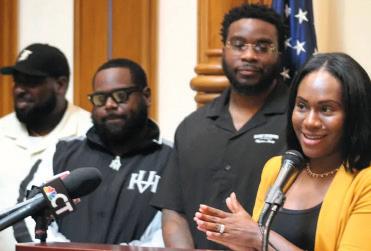
by Staff
New Haven’s cultural affairs chief is bringing her diversity-focused toolkit to the cultural center of the Southeast.
Adriane Jefferson is taking a step up to become Atlanta’s new cultural affairs director on Feb. 28, that city’s mayor’s office announced Monday.
Jefferson wrote in her own Facebook post announcing the move that she is “excited to step into this new chapter in Atlanta a cultural mecca that draws upon its deep history, resilience and creativity” and help “push culture forward in new and transformative ways.”
Jefferson has played a high-profile role in New Haven since Mayor Justin Elicker
named her to the cultural affairs director post with a mission to promote (in language that hadn’t yet become the target of the MAGA movement) diversity, equity and inclusion. She developed a cultural equity plan, helped launch an annual Black Wall Street festival, promoted new cultural ventures with a BIPOC focus.
Atlanta Mayor Andre Dickens was quoted saying he hopes Jefferson will bring to his city a similar focus on “cultural inclusion” and “commitment to fostering a city where art and equity thrive together.”
“New Haven, you will always be in my heart. Atlanta, I can’t wait to work with you all!” Jefferson wrote in her Facebook post.
relatively few federal dollars—it brought home how deeply federal funding is woven into every aspect of daily life, including the public goods and services on which many artists rely to survive. Even after a judge temporarily blocked the freeze Tuesday afternoon, a sense of uncertainty remained among those in the field, who no longer know what to expect from Washington.
As of Tuesday evening, a judge in Washington, D.C. put a pause on the memo. At the same time, White House Press Secretary Karoline Leavitt tweeted that the freeze was still in effect, sowing further disquiet among town and city governments and social service providers across the country. Then on Wednesday, the Trump Administration reversed the freeze, but said that a move to review and end “woke” ideologies would continue.
“I'm just speechless,” said McClain, whose organization’s $1 million general operating budget includes $25,000 in funding from the National Endowment for the Arts, in a phone call Tuesday evening. “It allows us to reach so many students and to prepare them to be the next generation of artists and leaders. At nonprofits, we have to penny pinch—we provide one-on-one music lessons, group lessons, snacks, tutoring, music help, and culturally sensitive workshops.”
“We want students to come here every day of the week … we want them to know that this is a safe place for them,” she added. “We do individualized programming depending on the needs of the students. We rely on the Board of Education for transportation. If that funding is cut, our students suffer.”
Tuesday, that story repeated over and over again in greater New Haven and across the state (and in Washington, where legislators like U.S. Sen. Chris Murphy called it an attempt “to undermine the very premise of American democracy.”) As city and state officials
refugee resettlement programs, and social services like SNAP (Supplemental Nutrition Assistance) and WIC (Women, Infants and Children).
They include dreamers, immigrants, and refugees, LGBTQ+ people, and trans and nonbinary kids who need access to gender-affirming care. In other words, they are already vulnerable to the attacks of a nascent administration, and now risk losing their livelihoods in the midst of it.
Elaine Carroll, who leads the New Haven Symphony Orchestra, pointed to the role that NEA funding plays in paying artists and doing new and responsive programming, particularly as the NHSO grows its repertoire and artistic footprint. In the past several years, federal dollars have covered the Helen Hagan Project, Harmony Fellowships, a Harlem Renaissance concert and Covid-19 job creation program that give artists work and teach audiences about new music in the process. Since 2019, it has received between $15,000 and $20,000 per year for its programming.
outlined a potentially devastating blow to basic services, arts leaders tried to figure out exactly what would be affected, and how quickly.
In Hartford, state Director of Arts, Preservation and Museums Elizabeth Shapiro called it “too early to know what this means,” but acknowledged that the Connecticut Office of the Arts (CoA) would almost certainly be affected (as would the State Historic Preservation Office or SHPO, which she also leads) in the next fiscal year. CoA's grant programs for this fiscal year appear unscathed, she said.
Currently, CoA receives $1,497,298 in discretionary spending from the State of Connecticut, as well as roughly $850,000 in interest from the Connecticut Arts Endowment. The other $1,026,100—roughly half of the office’s budget—comes from the National Endowment for the Arts. That money goes to statewide grants and covers one staff salary; two additional program associates are currently funded by the American Rescue Plan Act (ARPA), which must be used by the end of 2026.
“There are a lot of unknowns right now,” she said. She added that she’s in frequent contact with the National Association of State Arts Agencies (NASAA), which is still working to figure out what the next weeks—let alone the next four years— look like in terms of arts funding. Asked for a comment, a NASAA spokesperson said that the association is still monitoring the situation.
Arts leaders in and beyond New Haven echoed that uncertain feeling Tuesday, pointing to the far-reaching impact that a freeze could have on every aspect of daily life. Artists and creatives, many noted, also happen to be humans: they send their kids to public schools, ride the city bus, cycle, walk and drive on public infrastructure, use early childhood education programs like Head Start. They sometimes need access to subsidized housing,
“What we use this grant to do almost exclusively is to pay musicians' salaries,” Carroll said. Artists, in turn, “use that money to pay rent, to buy groceries,” and to fulfill other basic needs. If it’s cut off, that means fewer opportunities to pay artists who are trying—often through multiple gigs, teaching, and side hustles—to simply pay their bills.
That was the story at several nonprofits across the city. Eric Gershman, interim managing director at Long Wharf Theatre, noted the potential gap in programming that a freeze on NEA funds could cause the theater, which is currently in its second season in itinerancy. As tech rehearsals for El Coquí Espectacular and the Bottle of Doom continued at Southern Connecticut State University, Gershman explained that $110,000 of the theater’s current $4.3 million budget comes from the NEA. Of that, Long Wharf has only received $7,500 thus far. In addition, the theater has a $75,000 NEA grant that it plans to use in the next fiscal year.
“Long Wharf Theatre’s NEA-funded projects support some of our most important community engagement initiatives,” he said in a statement Tuesday afternoon.
“Should all federal arts funding stop, we may be forced to cancel or postpone these projects, which would prevent us from engaging and paying several artists and collaborators who rely on this work.”
“This would not only impact our sustainability as an organization and the livelihood of our artists and collaborators, but it would also negatively impact New Haven’s economy as the retail, hospitality, restaurant, and transportation sectors would also suffer from lower levels of activity.”
Tuesday afternoon, several individual artists said that they also feel anxious about what the freeze on federal funding means for them, both in and well beyond the realm of arts and culture. While artists don’t receive direct grants from agencies Con’t
by Adam Wassilchalk
Over the course of Eden, which opened this week at the Yale Rep, characters insist on the old adage that love makes you stupid.
One character claims, “You must be in love, because you ain’t using your head.”
Another notes, “If she was using her head, she’d be able to see the rocks in the road.” The dialogue contains dozens of references to intelligence, by way of the “head,” “brains,” “knowledge” and others the majority with the implication that love and intelligence are incompatible.
Despite what its characters may say, Yale Repertory Theatre’s production of steve carter’s (stylization à la bell hooks) 1976 play -– a revival directed by Brandon J. Dirden nearly 50 years after its original premiere with the Negro Ensemble Company -– shows quite the opposite: That love is brilliant, brave, and a key to liberation not to be overlooked.
The play centers on two young lovers and their families. Eustace Baylor (Chaundre Hall-Broomfield), who lives with his Aunt Lizzie (Heather Alicia Simms), falls hard for Annetta Barton (Lauren F. Walker), who lives right across the hall with her brothers Nimrod (Juice Mackins), and Solomon (Prentiss Patrick-Carter), sister Agnes (Alicia Pilgrim), mother Florie (Christina Acosta Robinson), and father Joseph (Russell G. Jones). It’s 1927 in Manhattan’s San Juan Hill neighborhood, a predominantly Black community that was razed and displaced to make way for Lincoln Center.
Eustace and Aunt Lizzie are Black Americans who recently migrated from the South as part of the Great Migration. Annetta and her family are Caribbean immigrants. Joseph, a devotee of Marcus Garvey and patriarch of the family, holds tightly to the belief that Black Americans are racially inferior to them, and that Annetta must marry someone from the West Indies to keep his bloodline pure. Annetta and Eustace’s forbidden love is one that digs deep into both the racial and gendered nuances of intracommunity prejudice, and is the catalyst for each of the play’s characters to challenge their own assumptions about what it means to love, learn, and liberate.
Under Dirden’s direction, the production is funny, fast-paced, intense, and enthralling. carter’s writing pulls no punches whatsoever; it had me leaning forward in my seat, gasping in shock, and raising my eyebrows repeatedly. Dirden holds the tension and momentum of the play with an iron fist, only allowing the briefest moments of reprieve to recover from one

moment to the next. The play flies by. Walker and Hall-Broomfield’s onstage chemistry is electric: through them we see not only how Annetta and Eustace impact each other when they’re in the same room, but also how their love sharpens their own thoughts, perceptions, and senses of self when they are apart. They each go toe to toe with Joseph in tense rhetorical battles, and it is their love that guides them to poke holes in Joseph’s ideologies about Black Americans, women, and love. Jones is highly formidable as the unshakeable and complex Joseph Barton, and his airtight performance gives every challenge to Joseph’s authority significant weight, and significant opposition. Each charged interaction between Walker, Hall-Broomfield, and Jones is thrilling. Eden’s supporting cast is also stellar. Simms brings a humorous and hearty touch to Aunt Lizzie, who loves Eustace as much as she wants to keep him out of trouble. Pilgrim, in the role of Agnes, provides an empathetic, witty, and clever foil to Annetta. Mackins portrays a delightful dynamic rapport with his onstage siblings as Nimrod. I was especially impressed with Patrick-Carter, an undergraduate junior, for bringing such a vulnerability and clear emotional arc to Solomon, the youngest Barton sibling, and arguably the one most pressured and changed by his father’s influence over the course of the play. Robinson tore my heart out as Florie, a mother caught between the strictly enforced duty of a wife and the
emotionally freeing desire to have her daughter experience the ecstasy she herself desperately longs for.
The ensemble too is at their most clever, most poetic, most courageous, most cooperative and most in solidarity with each other when supporting and being inspired by Annette and Eustace’s love. This is in stark contrast to Joseph’s own expressed beliefs and goal of having himself and his family return to Africa. Despite his steadfast and radical convictions, he mostly is unsuccessful at inspiring even members of his own household to collaborate toward his goals, except under duress. In a dramaturg’s note, Tia Smith, one of the production dramaturgs, notes a potential parallel between Joseph and Garvey himself, highlighting the fact that Joseph “believes that freedom and love cannot coexist” and that Garvey “never fully recognized his wife’s contributions, even as she combed through texts for his speeches and articles, edited and published his articles, and became the face of the movement during his imprisonment.”
Eden’s design supports the production’s subversive message about love. The designed world of the play eschews any typical flourishes one might see on a stage to indicate the presence of love. There are no harp effects, no pink light washes, nor any fancy design metaphors to express the magic or magnitude of Annette and Eustace’s affection. The scenic design (George Zhou costume Design (Caroline Tyson), lighting Design (Ankit Pandey),

John P. Thomas Publisher / CEO
Babz Rawls Ivy Editor-in-Chief Liaison, Corporate Affairs Babz@penfieldcomm.com
Advertising/Sales Team
Keith Jackson Delores Alleyne
John Thomas, III
Editorial Team
Staff Writers
Christian Lewis/Current Affairs
Anthony Scott/Sports
Arlene Davis-Rudd/Politics
David Asbery / Tanisha Asbery
Jerry Craft / Cartoons / Barbara Fair
Dr. Tamiko Jackson-McArthur
Michelle Turner / Smita Shrestha
William Spivey / Kam Williams
Rev. Samuel T. Ross-Lee
Contributors At-Large
Christine Stuart
www.CTNewsJunkie.com
and hair and wig design (Krystal Balleza and Will Vicari) are all finely detailed, naturalistic, and period-appropriate. Sound design and original music (Tojo Rasedoara) and projection design (Ein Kim) add a light touch of softer and more cinematic-leaning sensitivity to the design, but these aspects are present only for transitions. Overall, the message is clear: love itself does not change the world on its own, but it is a key motivator for Annette and Eustace to go out and change the world themselves, starting from within their own homes on 63rd Street.
Whether or not they succeed is another question entirely. In a second dramaturg’s note, Austin Riffelmacher, the other production dramaturg, notes that although “there are no white characters in this play… How the Barton family views the Baylor family, and vice versa, is the consequence of white supremacist and colonialist power.” While Annette and Eustace’s love motivates Eden’s characters to resist Joseph’s influence and ideology, they are also placing themselves in opposition to something that reaches far beyond the 6th floor of their San Juan Hill tenement. To learn how far that brilliant, brave, and liberatory love takes them, you’ll have to go see the production for yourself.
Eden runs through Feb. 8, and you can get tickets here.
Joan Marcus
A scene from Eden.
Paul Bass www.newhavenindependent.org
Memberships
National Association of Black Journalist
National Newspapers Publishers Association
Greater New Haven Chamber of Commerce
Greater New Haven Business & Professional
Greater New England Minority Supplier Development Council, Inc.
The Inner-City Newspaper is published weekly by Penfield Communications, Inc. from offices located at 50 Fitch Street, 2nd Floor, New Haven, CT 06515. 203-3870354 phone; 203-387-2684 fax. Subscriptions:$260 per year (does not include sales tax for the in State subscriptions). Send name, address, zip code with payment. Postmaster, send address changes to 50 Fitch Street, New Haven, CT 06515. Display ad deadline Friday prior to insertion date at 5:00pm Advertisers are responsible for checking ads for error in publication. Penfield Communications, Inc d.b.a., “The Inner-City Newspaper” , shall not be liable for failure to publish an ad or for typographical errors or errors in publication, except to the extent of the cost of the space in which actual error appeared in the first insertion. The Publisher reserves the right to refuse advertising for any reason and to alter advertising copy or graphics deemed unacceptable for publication. The entire contents of The Inner-City Newspaper are copyright 2012, Penfield Communications, Inc. and no portion may be reproduced by any means without the written permission of the publisher.



Edward A. Bouchet was the valedictorian of the Hopkins class of 1870, the first African-American to graduate from Yale College, and the first African-American to receive a Ph.D. in physics. His intellectual drive and dedication to his studies remain hallmarks of a Hopkins student today.
Since 1660, Hopkins School has provided students with an exceptional education and the skills required to succeed in the world.
To learn more, please visit us at hopkins.edu.
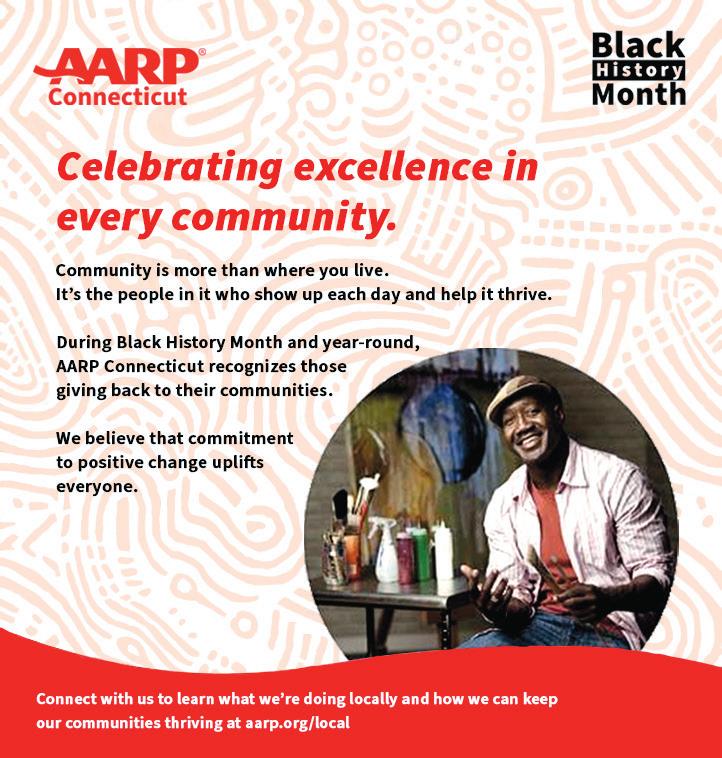









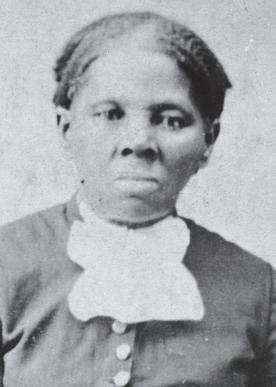
Boscov’s celebrates Black History Month and salutes the men and women whose many accomplishments and contributions have transformed our society. Their impacts on athletics, entertainment, education, journalism, government, and industry continue to influence our lives. We look forward to the youth of today continuing to mold our world and its bright future.
Lucy Gellman, Editor, The Arts Paper newhavenarts.org
The six monotypes feel like spring, even though the season is still months away. On one, the imprint of paan leaves resembles three rounded hearts, the shapes deep-veined and floating in a sea of cobalt blue. On another, a feather dances atop summer foliage, all soaked in the light green of rebirth. Below, elements of a face emerge amidst fragments of the natural world, this collision of man and that which he has tried to control.
The sextet is part of Shaunda Holloway: Abstract Rebel, a one-woman show now open at the Mitchell Branch of the New Haven Free Public Library. Curated by the bldg fund principal nico w. okoro, the exhibition celebrates Holloway’s deep connection to nature and the environment, making space for the jazz-flecked sensibility, poetry, Black history, and human-to-human connection that defines her oeuvre.
The show also marks a happy homecoming: Holloway’s work was on view last year during Westville’s annual Artwalk, and is now kicking off Black History Month. The library has also become a special place for okoro and her family, who come at least once a week for kids’ programming. Monday, both looked at home among the works, which turn the room into a kind of cultural sanctuary.
“I decided that I wanted to have a show that expressed the things that are important to me,” Holloway said at an opening on Monday night, pausing to greet friends and fellow artists as they came into the space. “I’ve come to the conclusion that choosing to be happy is an act of rebellion … and I’m having a good time. When I create a piece, it’s about not just the material, but the spirit of it. It’s an offering back to the work.”
That starts with the practice itself, which Holloway has deepened and played with for years. In a monotype, an artist inks a plate, works out whatever designs or interventions they want (for instance, pressing a leaf into the ink to create an imprint, or rolling on multiple layers of color), places paper on the plate, and then runs it through a press.
Unlike intaglio or relief printing techniques, where carved plates can be reinked, a monotype is one of a kind, producing only one image (sometimes the artist will make a second “ghost print,” with the ink that remains). That’s one of the things that makes it so special—there aren’t multiple editions of the work by design—making it the place where painting collides with printmaking.
Holloway’s own generous, thoughtful approach to process defines the exhibition, an installation of work—mostly monotype, but also painting and some collage—that fills but never overwhelms the space. Near the entrance to the room, the artist’s 2016 Look Forward greets viewers with a welcome, layered burst of color, its surface a wash of tangerine and sandstone. Atop that color, there’s a

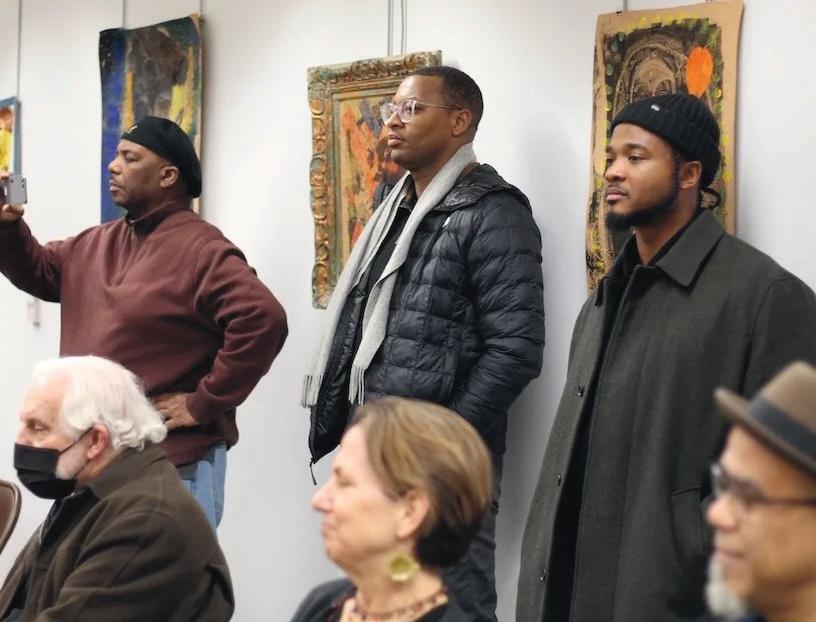

Year of Concern, a 2025 monotype on cork. rounded strip of black and white, a trio of orange flowers, a handful of undulating squiggles. It feels essential, poetic: shapes swirl around, cut through, and bloom from the surface of the paper, inviting a viewer to
across the paper.
So too in Holloway’s 2024 Proven, which explodes with swaths of deep, brighter-than-sunshine yellow, thick rows of sapphire and textured elements like netting, feathers, and black-and-white concentric circles. Between this dance of form and color, a profile emerges, floating vibrantly in space. Like a 2024 portrait of James Baldwin also in the show, it is one of Holloway’s new experiments on cork, part of her interest in substrate and reuse.
“In her layered collages, paintings, photographs, and prints, Holloway creates depth—both literally and figuratively— that honors the expansiveness of the African diaspora,” writes okoro in an accompanying checklist, and the words come alive around the room. “Her works contain a narrative quality, with stories that unfold the longer and harder a viewer engages the work, lending their own unique interpretation.”
Indeed, the works are so full of life that they all but breathe from the walls.
A viewer can feel it in What Is The Solution, as a long, mask-like face looks out into the room, its black and white on a layered, sumptuous background of blue.
Or Soul and City, where human forms, layers of blue and red and a leaning building lend the work a sense of movement.
Or her layered 2024 portrait of Baldwin in his centenary year, his look so intense it could bore a hole right through the viewer.
It’s palpable too, that joy and toil of living, in Holloway’s 2025 Year of Concern. In the work, a figure stands beneath a canopy of green and yellow dots, arms wrapped around two additional figures who sit beneath her. Their faces are masklike, exhausted, tired eyes accented with a neon yellow. Above them, the figure is haloed, beatific, as though she is trying to hold everything together in this moment.
The work has layers of meaning: the pain in the figures’ expressions, the peace of the embrace, the essence and act of living as the world continues to exist around them. An orange oval, the imprint of a leaf, flowers over her left shoulder. Something, in the midst of this interminably long month, is still in bloom.
If Abstract Rebel is solidly of the present, the spirit of the show also goes back to Holloway’s own childhood in the West Rock Housing Projects, where blight and nature lived side by side. As a kid growing up in the 1970s, Holloway received constant environmental messaging, from de-littering campaigns to Smokey Bear’s reminder not to start fires. Then she would step outside, and see trash that the neighbors—and the city—couldn’t be bothered to clean up.
ates her when she sees a driver roll down a window, and discard a piece of litter on the road, as if the planet is their private trash can.
“I want to have people recognize the connection between themselves and nature,” she said.
She has, of course, succeeded in spades. The monotypes in Abstract Rebel are as conceptually interesting as they are technically advanced, with a creator who wants to push her viewers to look closely (they would be wise to do so). It feels deliciously close in pieces like Genesis, where she has used fall leaves and multiple inkings to achieve a polleny, brilliant yellow fall color that is cut with the black and brown of tree bark, of soil, of things falling into decay. It’s the circle of life, in real time.
In new prints like People and Nature (one of her first experiments in monotype on canvas), she does it again, with a rich layering of color that feels new and heart-singingly bright. The piece, completed at Creative Arts Workshop, is a joyful riot of color, in which faces emerge among and sometimes inside fall leaves that dot the canvas. With over a half a dozen colors and three times as many shapes, it warrants a second, and third, and tenth close look, bursting with more meaning every time a viewer turns back to it.
At an opening Monday night, Holloway led with gratitude, taking a moment to recognize the people and places that have gotten her to this point in her career. In front of her, an audience included friends, family, colleagues from the New Haven Public Library to Kulturally LIT Fest and Creative Arts Workshop. Before reading original poems, she recalled one icy night several winters ago, when a stranger helped her scramble onto the sidewalk without slipping. That’s the sense of thanks she often feels when she presents her work.
Your efforts showed up like centuries, and I’m thankful for the hands that come together to support me, she read from the poem “Your Hands.” Fingers guide me / urge me to be patient / pull me together when parts of my soul are not adjacent. When doubt has my mind under siege / and I feel that what I must say / what I must have / is out of reach, she continued. You show me / You teach me / And I thank you.
come closer. When they inevitably do, the nuance of her work reveals itself: the interplay of color, texture and whisper-thin smears of ink, the collage-like elements that dance around each other musically, the sense of stillness and movement
“It was very disturbing to me,” she said. As she navigated life as a young artist, she watched the natural world in awe, documenting caterpillars as they morphed into butterflies, trees as they grew thick green foliage and then shed their leaves, snow that fell and crusted with ice each year. It instilled in her a sense of kinship with the world around her. To this day, it infuri-
“There are no words to express my gratitude,” she later added. “Gratitude is something that my mom was really into. And then when I was younger, I was really kind of rebellious—like why have it? But life will teach you to be grateful. And I’m grateful that I have a point of reference.”
Abstract Rebel runs at the Mitchell Branch of the New Haven Free Public Library, 37 Harrison St. in New Haven's Westville neighborhood, through the month of February.
like the NEA, they often benefit from the regranting of those funds, whether through a Designated Regional Services Organization (DRSO) or a 501c3 nonprofit that has gotten funds for specific programming.
Reached by phone, sculptor Linda Mickens called it “such an assault” on the rights and protections of artists—and of all Americans—who are just trying to live. In 2023, Mickens was a member of the New Haven Artists Corps, which has received funding from the NEA as well as the Mellon Foundation. Her work, which often looks unflinchingly at Black history, pushes back against what she sees as an attempt to censor and silence those who speak out against injustice.
In the interest of full disclosure, the Artists Corps is administered through the Arts Council of Greater New Haven, with which the Arts Paper is affiliated but editorially independent from.
“The aim is to quiet you, to not allow you to talk, to speak, to express yourself,” she said in a phone call Tuesday evening. “The arts have been hated in hard times, not just here, but all over the planet. You look at artists living the hard life —economically, racially—and then you take away grants that would help them. For me, it’s like, I’m really trying to hold on. He’s been in office not even a month and he’s wiping things away.”
“It is painful,” she continued with a catch in her throat. “It's devastating, it’s very concerning, and it’s depressing. People say we still have to have joy, and I understand that, but it's so much. It's just painful. And sometimes I feel like it's just hopeless as hell.”
Kulturally LIT founder IfeMichelle Gardin, who has served as an Artist Corps mentor and worked for several organizations that have received NEA funding, added that she’s bracing for a lack of federal help in arts and culture—but still trying to hold onto hope and harness creativity to organize.
Last year, she incorporated Kulturally LIT as a 501c3 organization specifically so she could qualify for grants, including those from the NEA (and NEA funds redistributed by state and city offices). Now, she’s trying to move forward without any expectations that those dollars will come in.
“I still believe in our mission in this era of banned books,” she said in a phone call Tuesday. “We’re still gonna be out here doing stuff and be more intentional about collaborating with people—hoping that folks believe in this because we have to come together. Our country has lived through oppression, depression, multiple wars, segregation—all the things that they [members of the Trump Administration] think America was great for.
She looked to the spirit—and the youth leadership—of collective organizing, including in the Student Nonviolent Coordinating Committee (SNCC) and the Black Panther Party. “That is my prayer,” she said. “That people start collectively coming together.”
by Zachary Groz
“It feels like a boom is happening in this city,” thundered Rev. Scott Marks to a roaring crowd of 1,000 New Haveners overflowing the pews, hugging the walls, and huddling criss-cross on the floors of Trinity Temple Church of God in Christ (COGIC) on Dixwell Avenue Tuesday night.
“But my question is: It’s a boom for whom?”
Marks posed the question to the sea of faces flooding the 285 Dixwell Ave. church, setting the scene for New Haven Rising’s “Solidarity Summit.”
The hour-and-a-half-long meeting convened the city’s four UNITE HERE locals Locals 33, 34, 35, and 217 and union-backed alders and other labor-friendly politicians for a rally, a fundraising and membership drive, and an address from UNITE HERE’s new Elm City-born-and-raised international president, Gwen Mills. The rally also served as a venue to announce a new effort to push Yale to finance a “People’s Endowment.”
Speakers at Tuesday’s event included Local 33 President Adam Waters, Local 34 President Lisa Stevens, Local 35 Chief Steward and Board of Alders President Tyisha Walker-Myers, and Local 35 President Bob Proto.
The city, Marks said, has been getting a lot of new investment these days, with billions of dollars surging to “luxurious housing and biotech” but the wealth hasn’t filtered down. Far from it. Now, he
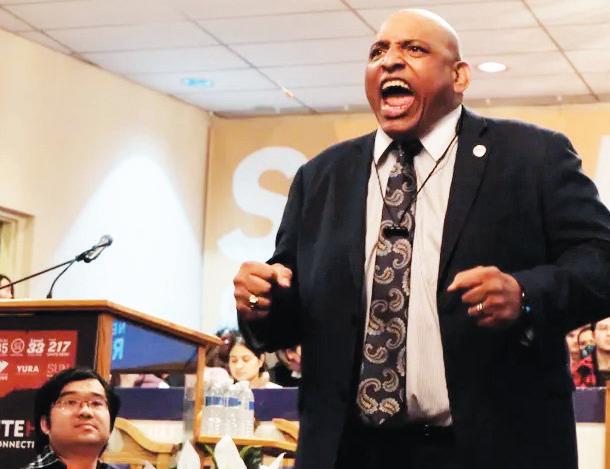
said, nearly half the city’s population is low-income.
Wages have stagnated, Marks continued, and the cost of groceries and rent and healthcare have shot up. One job doesn’t cut it these days now the average person needs two or three to get by.
And, of course, there’s Yale, the behemoth that New Haven Rising and the unions set out to tame more than ten years ago, waging an uphill jobs campaign that eventually won 1,000 full-time service, custodial, and clerical positions at the university for New Haveners, adding up to $40 million in wages and benefits.
Those numbers are according to both commitments Yale made and New Haven Rising’s website.
The bloc’s new goal is to push Yale and its $41 billion endowment to finance a “People’s Endowment,” helping to lay the foundation for a “fully funded city,” equipped to tackle housing affordability and boost the public school budget. (Click here to read about the latest city-Yale deal, approved in 2022, which increased the university’s voluntary payments to the city by $10 million a year for five years and handed over a city-owned block of High Street to the university to create a
publicly owned car-free walkway, among other provisions.)
Marks related the effort all the way back to Yale’s creation three centuries ago. “I thought about the men who founded Yale, men who profited from slavery, men who profited from the system that held my family in bondage,” he said to Tuesday’s crowd.
And Marks tied it to the memory of his godson, Daily Jackson, who was shot and killed late last year. “I thought about my godson’s fate,” he continued, “the fact that Yale’s leaders, who crushed the opportunity for the first Black college in the nation the first Black college, not down south but right here in New Haven. I wonder how things would be different for all those years that were cut off and knocked back, the lives that would be changed.”
The other big 2025 policy priority for New Haven Rising and the unions is passing Senate Bill 8, a bill now making its way through the state legislature. If passed, the bill would make striking workers eligible for unemployment benefits. Moves like that at the state and local level, speakers from the locals stressed throughout the night, will be all the more important as the Trump administration guts federal labor protections and targets unions and immigrant workers. The struggle, Mills said, begins in New Haven.
“Right here at home,” Mills said, “we’ve got to pass SB 8, we’ve got to mobilize this city in favor of affordable housing, and we have to insist that Yale settles fair contracts and is redistributing money in the City of New Haven to level the playing field once and for all.”
by Laura Glesby
Mayor Justin Elicker came to a Whalley/Edgewood/Beaver Hills community meeting with a question: Should the Whalley Avenue jail move somewhere else?
The meeting took place Wednesday in a back room of the Whalley Avenue police substation, where a crowd gathered for an evening town hall with the mayor, convened by newly elected Beaver Hills Alder Gary Hogan.
State legislators are weighing whether to study the feasibility of relocating the Whalley Avenue jail as well as the Bridgeport Correctional Center on North Avenue further away from their respective residential communities.
New Haven legislators Al Paolillo, Toni Walker, Juan Candelaria, Steve Winter, Martin Looney, and Gary Winfield proposed the study bill, H.B. 6364, which has now been assigned to the Judiciary Committee.
According to Elicker, the bill arose from a collaboration between the cities

“The message of having a prison in a neighborhood is not a good message,” Elicker said.
The residents present didn’t have an answer to Elicker’s question of whether the jail should move ready, instead, for a longer-term dialogue.
Neighbors of the facility have raised the idea of moving the jail at community meetings in the past, arguing that its presence implies that Dixwell and Beaver Hills kids are destined for prison.
The jail, known formally as New Haven Correctional Center at 245 Whalley Ave., primarily incarcerates men who are awaiting trial and, due to Connecticut’s cash bail system, are there simply because they cannot afford their bail.
It’s a “level 4,” “high security” (one level below “maximum security”) facility with 686 incarcerated men as of December 2024, according to the state Department of Correction.
Elicker also noted that the location of the jail could be repurposed in coordi-
nation with efforts to revive the historic New Haven Armory, which is slated for new life in a to-be-determined form.
There are reasons to consider not moving the jail, Elicker added. One is that due to the cost of relocation, as well as potential hostility from neighbors of any alternative location, moving the jail might not be realistically possible.
He remarked that some New Haven families with loved ones incarcerated in the jail may appreciate its accessibility (including its location on a bus line). And he noted that the city receives Payment In Lieu of Taxes (PILOT) funding from the state tied to the jail.
The bill is about “exploring” the relocation, he emphasized. “It may never happen” and if it does, it would likely take a long time to come to fruition.
Raymond Hagan raised his hand. “To what extent will residents be involved with the decision making?” he asked. “We’re talking about a really long process,” which would entail plenty of community feedback, Elicker responded. “Where it could possibly go is a big question,” he added.
by Zachary Groz
Back in 2021, Connecticut implemented a first-in-the-nation law to make gun violence prevention services eligible for Medicaid reimbursement, which, at the time, was heralded as a major bipartisan breakthrough on an issue that had otherwise been deadlocked for decades.
Since then, those funds have supported programs in New Haven, which deliver wrap-around social services directly to gunshot victims and counseling to at-risk youth.
But the funding, which providers say is already too little, is now in the crosshairs of a Trump-backed effort to slash Medicaid spending across the board. And just last December, GOP Congressman Andrew Clyde of Georgia introduced a bill in the House of Representatives that targets the gun violence appropriations, potentially blocking Connecticut and six other states from billing Medicaid for the intervention services.
In response to the impending cuts and a possible all-out blockade, U.S. Rep. Rosa DeLauro convened a roundtable of about a dozen providers, city officials, gun violence survivors and advocates, and researchers to hear about how an abrupt reversal in federal policy would affect their work.
The group met Thursday afternoon in the basement of the Yale School of Public Health at 60 College St. for a discussion that touched on a wide range of themes. Topics included the expected funding

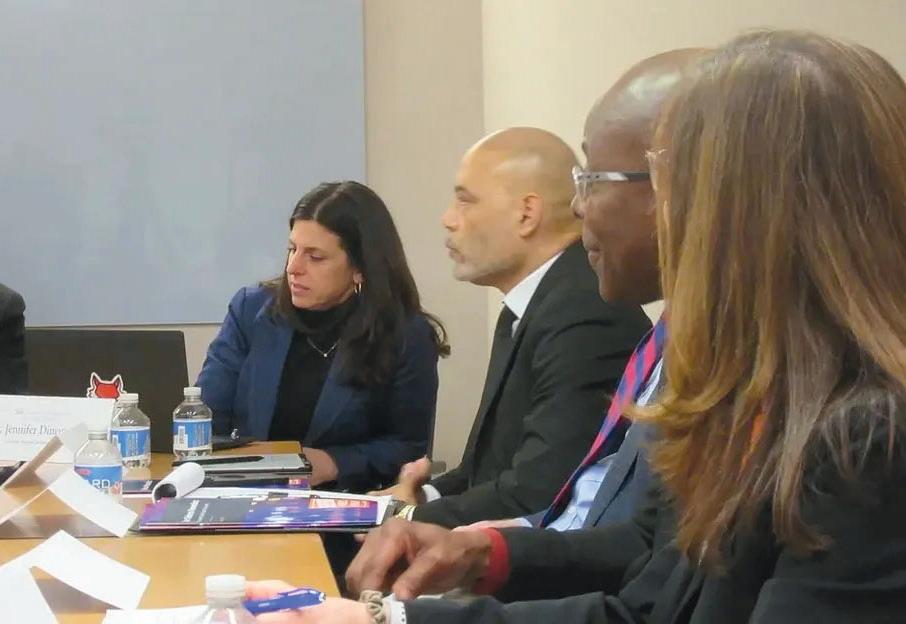
shortfall, data-gathering to maximize the efficacy of current programs, future convenings to coordinate a city-wide campaign to break cycles of violence, and ways of helping survivors cope with the physical and psychological damage that lingers after shootings.
But more than anything else, the conversation emphasized, in the words of city Director of Community Resilience Tirzah Kemp, “thinking about the work holistically.”
“I want us to reframe how we think about the victims, especially in brown and Black communities, that are impacted by gun violence,” she said at the meeting. “Everybody’s the victims. Every single person is the victim in the entire community.”
Working from that assumption, she said the city has built out a “victims-services support network” that helps communities that have been shattered by gun violence with broadbased support. “We connect with legal aid, provide advocacy for the family, we provide intensive coordinations,” Kemp said of the action plan that goes into effect after a shooting. “So we bring all the partners who are connected to this individual together to think about the wraparound services for everybody who’s involved.”
The idea is to look at a whole “ecosystem” of factors like housing insecurity, hunger, limited education, and mental health issues that might contribute to a person’s exposure to gun violence. The leading program on that front is the Hospital-based Violence Intervention Program (HVIP) run out
of Yale New Haven Hospital, which links emergency room patients with gunshot wounds to social workers and benefits, including mental health counseling and cash assistance.
“We have solutions that are working, and we are just seeing the glimmers of those solutions,” said James Dodington, a pediatric ER doctor and the medical director of the hospital’s Center for Injury and Violence Prevention, which coordinates a response team of social workers who meet bedside with shooting victims, as well as victims of sexual assault and domestic violence.
With the Medicaid reimbursements and influx of federal American Rescue Plan funds, the center has been working with community providers and the city on treating gun violence as a systemic medical issue rooted in economic and social conditions. “None of this would be possible without really tectonic shifts that have happened in the last few years to make this ecosystem work.”
As the federal government shifts again, this time away from the funding streams that have helped these programs run, DeLauro urged the providers, community members, and city officials to push back. “You are the external pressure. I work in an institution that responds to external pressure. You see how in 48 hours they turn something around,” she said of the Office of Management and Budget memo freezing federal aid issued on Monday and rescinded Wednesday. “They had no business being into this, but nevertheless they felt the heat.”
The Stratford Library, in conjunction with the nationwide celebration of “Black History Month”, will present special events relating to the black experience covering film, discussion and literature. As part of its long-range plan, the Library will provide Stratford residents with materials and programs which foster understanding of and appreciation for their heritage and for the diversity of the community. Programs are free and open to the public. All are held in the Library’s Lovell Room.
The special “Black History Month” events scheduled at the Library:
• Talk: Learn About RiSE
The purpose of the RiSE study is to learn whether the stress reduction program, called “Resilience, Stress, and Ethnicity”, improves the body’s response to stress in African American women who have risk factors for heart or metabolic disease. At this tabling event, you can ask questions,
grab handouts, and sign up to be screened for eligibility. Participants may receive up to $500 for their time. Snow date: 2.12.25
Monday, February 10 10am – Noon Main Lobby
• Monday Matinees: “The Piano Lesson” Monthly series will screen the critically acclaimed film adaptation of August Wilson’s prize-winning drama. During the aftermath of the Great Depression, the Charles family debate the value of their family piano, which documents the family history through carvings made by their enslaved ancestor. Samuel L. Jackson leads an excellent cast. PG-13, 125 minutes
Monday, February 10 Noon Lovell Room
• Books Over Coffee: Master Slave Husband Wife
Monthly book discussion examines au-

story about a young, enslaved couple, Ellen and William Craft, who achieved one of the boldest feats of self-emancipation in American history. Posing as master and slave, while sustained by their love as husband and wife, they made their escape together across more than 1,000 miles. Linda LiDestri hosts the discussion.
Wednesday, February 26 Noon Lovell Room
• Meet the Author: Andy Piascik Author Andy Piascik will discuss his new book, Radical Connecticut, which details how Nutmeggers have a long tradition of making history ‘from the bottom up”. Autographed copies of his book will be for purchase following the talk.
Thursday, February 27 6:30-8 pm Lovell Room 1.27.25
Some Connecticut families could see an increase of $3,000 per year for health coverage if legislation is not passed soon.
Enhanced subsidies created through the 2021 American Rescue Plan Act (ARPA) and extended through the 2022 Inflation Reduction Act (IRA) have made health insurance coverage more affordable and accessible for millions of Americans enrolled in federal or state-based marketplaces like Access Health CT (AHCT).
Reducing the rate of the uninsured is a critical part of AHCT’s mission, and these subsidies have played an important role in cutting the state’s uninsured rate in half and bettering the health of thousands of people.
This financial help has led to record-breaking enrollment in Connecticut. AHCT enrolled a total of 151,151 residents in Qualified Health Plans (QHPs) for Plan Year 2025, exceeding last year’s record of 129,000 people. Because of the enhanced subsidies, 90% of Connecticut residents enrolled in a QHP get financial help, for a total of $91,460,464 each month.
Unfortunately, the enhanced subsidies are set to expire at the end of this year. This will impact everyone. Many Americans, including tens of thousands of Connecticut residents, will see their health coverage costs dramatically increase if Congress does not act to extend or make these enhanced subsidies permanent. Many could be left without healthcare coverage at all.
As healthier-than-average people exit the marketplaces if the enhanced subsidies are no longer available, insurers will raise premiums for the remaining enrollees. In addition, hospitals will continue to treat those who are uninsured and unable to pay, further increasing uncompensated hospital costs. Those costs are then passed along to consumers.
These enhanced subsidies substantially increase the amount of financial help AHCT customers can receive and expand that help to people who were previously ineligible. According to the Centers for Medicare & Medicaid Services (CMS), the uninsured rate in the United States is at an all-time low because of this increased financial help. And if the subsidies do expire,
the Congressional Budget Office expects nearly four million Americans will lose their insurance by 2034, leading to a sicker country overall.
If the enhanced subsidies are not extended past Plan Year 2025, Connecticut residents could expect to pay $1,527 more on average per year for their health insurance. Some residents will see a nearly $3,000 increase per year. This will be catastrophic for many families in our state.
Connecticut is fortunate to have strong advocates at the legislative level who have championed increasing access to health coverage and making it more affordable. Our state leadership has also shown strong support for the enhanced subsidies that benefit so many.
We hope the Connecticut delegation in Washington D.C. will continue to advocate for the extension of these subsidies and encourage others from across the country to join them in support of all Americans. We must do all we can to protect families from being unable to afford health insurance or we will see a dramatic decrease in the overall quality of health in our state.
Access Health CT is committed to helping keep our customers healthy in any way we can.
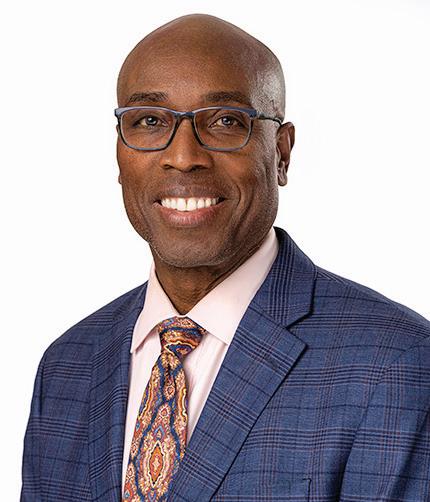
James Michel
Chief Executive Officer, Access Health CT
At an event held in Battell Chapel, Bishop William J. Barber II urged the audience to act on the civil rights leader’s moral vision.


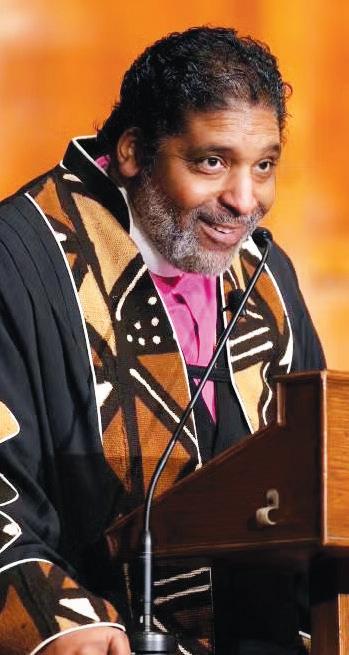


Bishop William J. Barber II, a moral movement leader and founding director of Repairers of the Breach, which trains social justice leaders, addressed Battell Chapel during Yale’s annual Martin Luther King Jr. Commemoration event on Jan. 27 — the 25th year this event has been held.
Barber, who is also founding director of the Center for Public Theology and Public Policy at Yale Divinity School and a professor of the practice at the school, delivered a talk titled, “More than a Sermon:
Martin’s Last Message to Us Now.” In it, he urged the audience not to approach the memory of King with simple remembrance and reverence, but to recognize the work still to be done.
“[King] had a prescription for America’s ailment,” Barber said. “He said we needed a massive, nonviolent army of love that must come together across all the lines that divide us and build a power that enables us to express our love. He bid us to stand together and to recognize that we were equals before the throne of a
loving God and that calls us to love and to stand and to do justice.”
(In an interview last week with Yale News, Barber spoke about King’s legacy and his own work building a grassroots movement of “moral fusion politics.”)
Following the talk, Barber was joined in conversation by the Reverend Eboni Marshall Turman, associate professor of theology and African American religion at Yale Divinity School, who also serves as one of the co-chairs of the Black Theology group of the American Academy of
Religion and as the personnel chair for the Society of Christian Ethics.
The event also featured performances by Sharmont “Influence” Little, an activist, actor, and current poet laureate of New Haven, the student a cappella group Shades of Yale, and the singer-songwriter Yara Allen, artist-in-residence at the Center for Public Theology and Public Policy, who led the audience in a calland-response song. A performance by the Kergyma Choir closed the event.
The Office of the Secretary & Vice
President for University Life and the Yale College Dean’s Office were presenting sponsors of the event; the planning committee was led by Risë Nelson, the inaugural director of diversity, equity, inclusion, and accessibility for Yale Library & Collections.
The Battell Chapel commemoration was part of a series of events held on the Yale campus and across New Haven this month to honor and reflect on the legacy of the late civil rights leader.
New Haven, Conn. (January 24, 2025)
–A special community day will be held from 12 to 4 p.m. on Saturday, February 15, 2025, offering tours and conversation around the New Haven Museum’s exhibition, “Shining Light on Truth: New Haven, Yale, and Slavery,” prior to its closing on Saturday, March 1, 2025. Presented by the Beinecke Rare Book and Manuscript Library, Yale Library, the exhibition highlights the essential role of enslaved and free Black people in New Haven and at Yale.
Visitors will be encouraged to tour the exhibition, with members of the exhibition team available for questions and conversation. Visitors may also join any of the related programs in the New Haven Museum auditorium:
1:00 p.m. - Welcome and remarks
Curators Michael Morand and Charles Warner and Designer David Jon Walker will offer brief reflections on the exhibition and its impact since it went on view to the public in February 2024 and share some thoughts about the ongoing work of engaging the history and legacy of New Haven, Yale, and slavery.
1:30 p.m. - Film screening: “What Could Have Been”
A special screening of the short documentary film about the proposal for
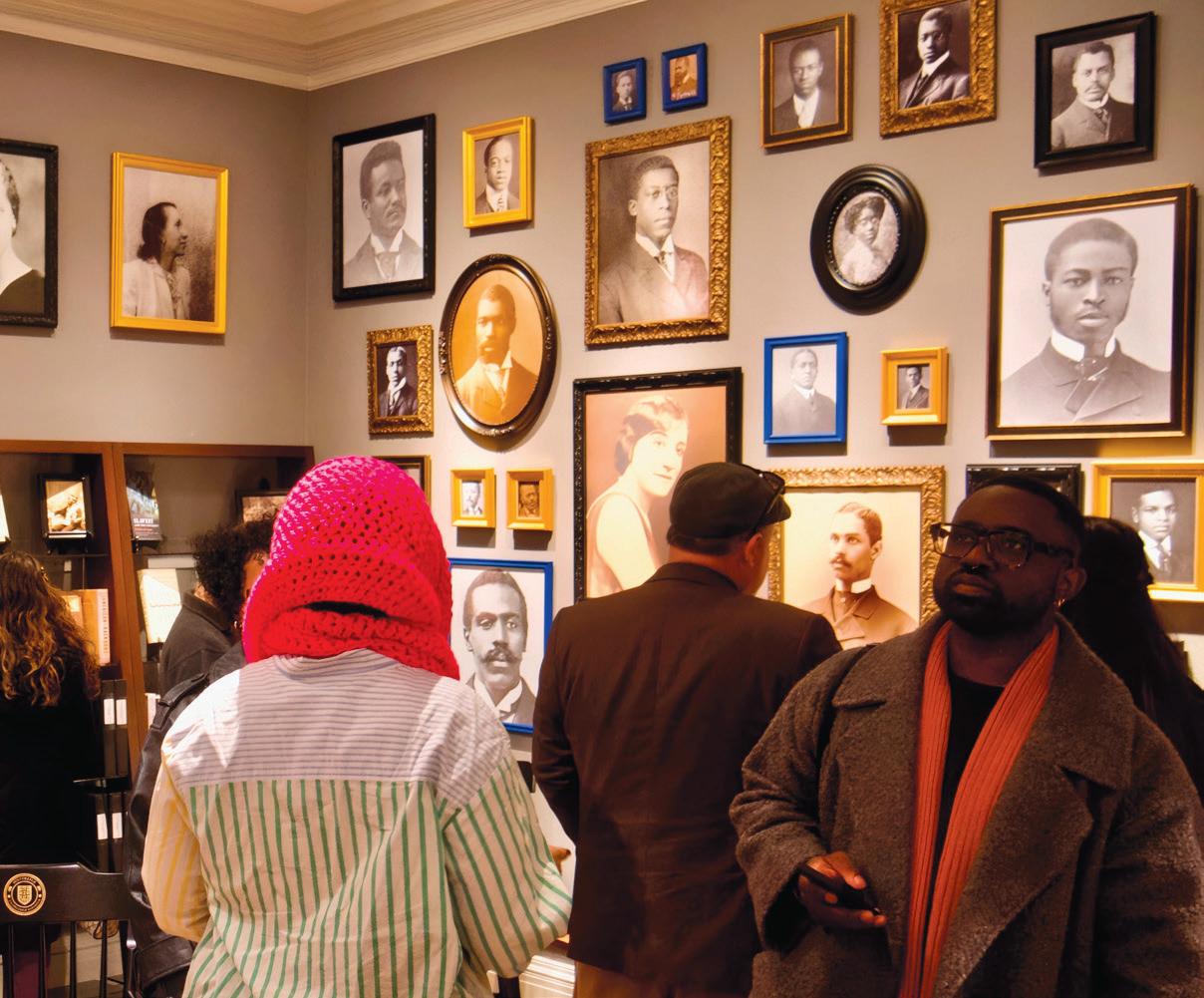
Photo Credit: Defining Studios
America’s first HBCU in New Haven, Connecticut, 1831, followed by a Q&A and conversation with the production team.
3:00.p.m. - Ubuntu Storytellers: Sweeps and Scholars Story artist Denise Manning Keyes
Page will share her experience of discovering her maternal family ancestry. Her journey was challenged by factors including orphancy, mixed ancestry, and the interchange of family first names. Despite the obstacles, and thanks to listening curiously, research, intuition, and a heaping dose of luck, Page was
able to unearth a pre-1850 history about an enslaved ancestor and his New Haven and Yale student descendants. Some of Page’s “luck” is attributed to the research resources of the Beinecke Library and is reflected in the “Shining Light on Truth: New Haven, Yale, and Slavery” exhibition at the New Haven Museum. Page’s 90-minute presentation begins with her personal story, “Mariah,” followed by an opportunity for audience engagement in reflecting on one’s own family story and available lists of nontraditional resources to continue or begin one’s own family history.
“Shining Light on Truth: New Haven, Yale, and Slavery,” is presented by the Beinecke Rare Book and Manuscript Library and Yale University Library. The exhibition complements the publication of the book “Yale and Slavery: A History” (Yale University Press, 2024) by David W. Blight with the Yale and Slavery Research Project. It draws from the research project's key findings in areas such as the economy and trade, Black churches and schools, the 1831 Black college proposal, and memory and memorialization in the 20th century and today. The exhibition has a special focus on stories of Black New Haven, including early Black students and alumni of Yale.
The exhibition features archival images of materials from Beinecke and other
collections and connects to items in the New Haven Museum collections. It introduces visitors to some of the unheralded builders of Yale. It celebrates early Black writers such as Jupiter Hammon, Jacob Oson, and William Grimes, and showcases women such as Mary Ann Goodman, whose generosity opened paths for Black students at Yale, as well as the women who were local pioneers in Black education early in the 19th century.
Admission to the New Haven Museum remains free during the show’s run, made possible by Yale University.
About the New Haven Museum
The New Haven Museum has been collecting, preserving and interpreting the history and heritage of Greater New Haven since its inception as the New Haven Colony Historical Society in 1862. Located in downtown New Haven at 114 Whitney Avenue, the Museum brings more than 375 years of New Haven history to life through its collections, exhibitions, programs and outreach. As a Blue Star Museum, the New Haven Museum offers the nation’s active-duty military personnel and their families, including National Guard and Reserve, free admission all year. For more information visit http:// newhavenmuseum.org or @NewHavenMuseum or call 203-562-4183.
Dr. Gladys West is inducted into the Air Force Space and Missile Pioneers Hall of Fame during a ceremony in her honor at the Pentagon in Washington, D.C., Dec. 6, 2018. West was among the so-called "Hidden Figures" part of the team who did computing for the U.S. military in the era before electronic systems. The Air Force Space and Missile Pioneers Hall of Fame is one of Air Force's Space Commands Highest Honors.(Photo by Adrian Cadiz)
Gladys West, a brilliant mathematician, inventor, and pioneer in the field of geodesy, has made a significant contribution to the world of technology. Born in 1930 in Virginia, West grew up in a segregated society where opportunities for African Americans were limited. However, her remarkable academic achievement and exceptional mathematical abilities paved the way for her to become one of the most influential innovators of our time. Despite her groundbreaking work, Gladys West’s achievements have largely remained unknown to the world. In this blog post, we will delve into the top ten secrets of Gladys West’s life and inventions, highlighting her remarkable accomplishments, groundbreaking innovations, and the challenges she faced as a black woman. We will also discuss how her inventions transformed the world of technology and geodesy, and how her legacy continues to inspire young innovators today. From her groundbreaking work on the calculation of satellite orbits to her contribution to the development of GPS technology, Gladys West’s life and inventions provide a fascinating insight into the world of scientific innovation and the power of determination. Despite facing many challenges as a woman of color in the male-dominated field of mathematics and engineering, Gladys West has continued to push the boundaries of what is possible. Her work has helped to shape the modern landscape of navigation and location-based technology, and her impact on the field cannot be overstated. As we explore the top-ten secrets of Gladys West and her inventions, we gain a deeper understanding of the incredible achievements of this remarkable woman and the legacy she has left behind.
1. Gladys West: Mathematician and Inventor
Gladys West, a mathematician and inventor, is known for her groundbreaking contributions in the field of GPS technology. As a member of a team of mathematicians at the U.S. Naval Weapons Laboratory, she worked on the development of an extremely accurate model of the shape of the Earth. Her work played a crucial role in the development of the Global Positioning System (GPS). In addition to her work on GPS technology, West has also made significant contributions in the field of computer programming. As one of the few African American women in her field during the 1950s and 1960s, she has overcome numerous obstacles to achieve
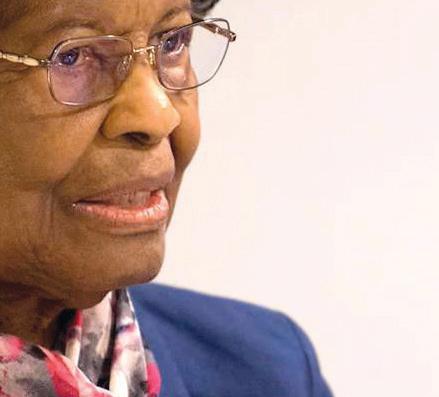
success and recognition as a pioneer in her field. Her story serves as an inspiration to all who aspire to make a difference in the world through their work. In this document, we will explore ten secrets of Gladys West’s life and career that have contributed to her success and impact on the world of technology.
One of the top ten secrets of Gladys West (1930- ) is her pivotal role in developing the Global Positioning System (GPS). West’s involvement in GPS dates back to the 1970s when she was a mathematician at the Naval Surface Warfare Center in Dahlgren, Virginia. West was part of a team tasked with conducting complex calculations to determine the precise locations of satellites and rockets in space. Her calculations were instrumental in improving the accuracy of GPS and making it a reliable tool for navigation. West’s contributions to GPS were not widely recognized until 2018 when she was inducted into the Air Force Space and Missile Pioneers Hall of Fame. Her work has fundamentally changed the way we navigate and has enabled countless
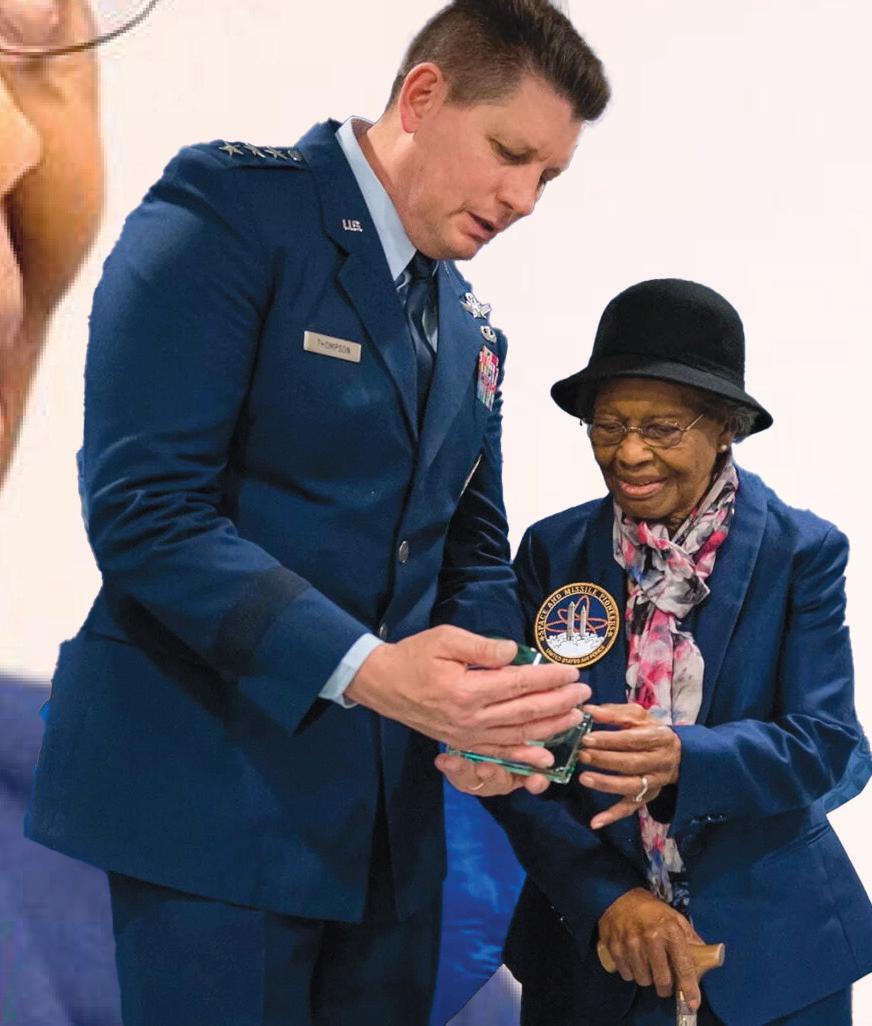
advances in areas such as transportation, logistics, and defense.
3. Development of mathematical models
One of the top secrets of Gladys West, a mathematician and one of the hidden figures behind the development of the Global Positioning System (GPS), is her expertise in the development of mathematical models. West’s contributions to the field of geodesy, which involves the study of the Earth’s shape, gravity field, and rotation, revolved around creating mathematical models that accurately represented these complex phenomena. Mathematical models allow scientists to better understand and predict the behavior of natural systems, and West’s models for geodesy have been instrumental in the development of GPS technology. Her work involved creating models for the Earth’s shape and gravity field, as well as refining models for satellite orbits and their interactions with the Earth’s atmosphere. West’s skill in developing these models was crucial in the success of GPS, which is now widely used for navigation and location-based services around the world.
in the history books. Her work paved the way for the development of more accurate GPS systems that we use today. West’s calculations were instrumental in correcting errors in the early GPS systems that were caused by the curvature of the Earth and other factors. By factoring in these variables, West and her team were able to create a more precise GPS system. Her work has had a significant impact on the field of GPS technology and has contributed to the development of many advanced systems that are used today.
6. Early struggles and perseverance
Gladys West, a pioneering mathematician, was born in Virginia in 1930. Her journey towards success was not an easy one, and she faced early struggles in her life. However, her perseverance and determination led her to achieve great heights in her career. West grew up in a segregated community and faced various challenges due to her race and gender. Despite this, she remained focused on her education and earned a bachelor’s degree in mathematics from Virginia State College. She then went on to pursue graduate studies, which were an even greater challenge due to the lack of opportunities available for women of color at the time. Despite these obstacles, West persisted and earned a master’s degree in mathematics from the University of Tulsa and later obtained a PhD in public administration from Virginia Tech. Her early struggles and perseverance serve as an inspiration to all those who face challenges in their lives and strive towards achieving their goals.
7.
4. Contributions to satellite tracking
Gladys West is a pioneering mathematician and a key contributor to satellite tracking. Her work has been instrumental in the development of the Global Positioning System (GPS), which is now an indispensable tool for navigation and positioning. West’s contributions to satellite tracking are numerous, including her development of algorithms to predict satellite orbits and her work on the design and implementation of the control segment of the GPS system. Her calculations and modeling have enabled more precise tracking of satellites and have significantly improved the accuracy and reliability of GPS technology. In recognition of her contributions, Gladys West was inducted into the Air Force Space and Missile Pioneers Hall of Fame in 2018. Her work remains an important part of the history and ongoing development of satellite tracking and GPS technology.
5. West’s groundbreaking calculations
Gladys West’s groundbreaking calculations, which are considered to be one of her significant contributions in the field of GPS technology, have earned her a place
Gladys West, born in 1930, is an American mathematician and one of the pioneering African American women in the field of geospatial information systems. While West is best known for her contributions to the development of the Global Positioning System (GPS), her career as a teacher is also notable. After earning her bachelor’s degree in mathematics from Virginia State College, West began teaching math in Sussex County, Virginia. She later earned a master’s degree in public administration from the University of Oklahoma and continued teaching for over 40 years, including serving as an adjunct professor at Virginia State University. Throughout her career as a teacher, West inspired and encouraged countless students to pursue careers in STEM fields. Her dedication to education and her impact on students make her an important figure in both the fields of mathematics and education.
8. Recognition for her achievements
Gladys West, a mathematician and one of the “hidden figures” of the United States space program, is renowned for her contributions to the development of the Global Positioning System. One of




by Thomas Breen
Adrian Huq took a quick break between classes Tuesday to join a Transit Equity Day event on the Green where they called for free bus rides for people 18 and under, before rushing to catch the 234 on Church Street to head back to school.
Huq, 22, was one of a half-dozen speakers at a midday press conference held at the corner of Church and Chapel Streets and organized by local transit and climate activist Melinda Tuhus.
The event was held on what would have been Civil Rights icon Rosa Parks’ 112th birthday, and saw bus riders, advocates, and city officials call for a cleaner and more expansive public bus system. Huq focused their remarks on calling for the state to abolish fares for all public bus riders aged 18 and under.
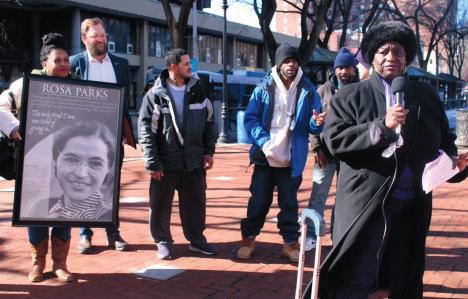
A recent Metropolitan Business Academy graduate who is now a first-year master’s student at Yale’s School of the Environment, Huq said they still take the bus the 255, to be exact five days a week to go to and from their home in Derby.
bus fares from April 2022 to April 2023 provided “essential financial relief” for all riders struggling with pandemic-era inflation. Ridership went up; the bus system worked better.
Now, they said, the state should do something similar to encourage young people to ride the bus to school and work, and to provide financial relief for parents across Connecticut.
“It’s high time to invest in youth and subsidize free rides” for riders 18 and younger, they said.
(DOT) spokesperson Josh Morgan told the Independent that the state “has been investing in longer, more frequent service hours and establishing new routes to fill gaps in transit service.” That includes extending service for 17 local routes in the Greater New Haven area to 1 a.m.
“As operational costs continue to rise, groups seeking fare exemptions are costs that would need to be made up elsewhere,” Morgan continued. He said the state offers the CTpass program, which already provides discounted fares to all schools.
CTtransit also already offers free fares for children under 4 years old, and discounted fares for those aged 5 to 18.
As a New Haven high schooler, Huq regularly took the public bus home from after-school programs, and has long spoken up about the importance of a reliable, efficient, comprehensive, and eco-friendly public transit system in their role as a leader with the New Haven Climate Movement. (They’re also now backing a “transportation transformation resolution” that the New Haven Climate Movement has introduced to the Board of Alders.)
“Transportation is no minor expense,” Huq continued. Thirty-one day passes cost $63. Yes, a state bill passed last year provided New Haven’s school system with $175,000 to buy bus passes for students. That goes a long way to helping young New Haveners use public transit. But, they continued, the state should “forego the middleman” of school districts and just allow anyone up to 18 to ride free on CTtransit.
Huq said that the state’s abolition of
State Department of Transportation
As Tuesday’s Transit Equity Day event on the Green wound to a close, with speakers preparing to take a ceremonial bus ride along with a picture of Rosa Parks, Huq headed off to catch a bus of their own in order to get back to the Yale School of the Environment in time for their environmentally themed writing class.
by Laura Glesby
Two weeks into an onslaught of federal policy upheavals and funding threats, New Haven is still tackling problems that long precede Donald J. Trump. That dual focus emerged from Mayor Justin Elicker’s annual State of the City address in the Board of Alders Chamber on Monday night.
Alders, journalists, city employees, and a handful of civically-minded residents filled the room to hear Elicker’s speech.
As with previous years’ addresses, the mayor touted his administration’s accomplishments the year before.
He celebrated a crackdown on unsafe housing conditions, a 25 percent decrease in shootings in 2024, an impending policy restricting cell phones in schools, a long-awaited police contract expected to help with retention and recruitment, and expansions in vocational and technical educational opportunities, among other developments.
He reported that more than 1,000 new apartments became available last year, over 40 percent of which are being rented below the market rate. And there’s more building yet to do, Elicker argued.
“Just like when there is not enough oil available, the price of gas goes up, or when there aren’t enough eggs in production, the price of eggs goes up: When there isn’t enough housing, the


price of housing goes up. And this is untenable for our residents,” he said.
He set a new goal for the city of building 10,000 new housing units “with at least 30 percent of those units affordable” within 10 years.
The housing affordability crisis was one long-brewing challenge that Elicker addressed along with persistent gun violence, climate change, and insufficient educational resources (which Elicker argued should be funded by the state), among others.
The mayor warned that the city’s ef-

forts to combat these challenges are at risk of losing funding under the Trump administration.
“They will try to force us to choose between eliminating our Black and brown contractor and entrepreneurship programs or lose significant funding that benefits all in our community,” he said. “Or a choice to either allow a young transgender athlete to play high school sports or lose massive amounts of school funding that all our students rely on for success. Or a choice to coopt our police department to hunt down good, hard-working, community members who also happen to be immigrants or lose public safety funding that will make our community more dangerous.”
“You see, these choices, they are created by design,” he continued. “They are intended to divide us – to pit one group of us against the other. We won’t let that happen. To the Trump Administration: New Haven stands together.”
Exactly how New Haven will stand together and navigate potential choices that Elicker called “impossible and unethical” remains to be seen.
In the meantime, the city’s federally-funded housing inspectors will check tenants’ homes for unsafe conditions. City planners will draft zoning regulations and public health staff will prepare for the next pandemic. Teachers will help their students solve math equations, explore manufacturing careers, and learn English as a second language.
the secrets to her success is the recognition she received for her achievements. Throughout her career, West has been honored for her work, including being inducted into the Air Force Space and Missile Pioneers Hall of Fame in 2018, and receiving the Black Engineer of the Year Award in 2019. These accolades have not only boosted her self-esteem but have also served as a source of motivation for other women and people of color interested in STEM careers. It is crucial to recognize the achievements of individuals like Gladys West, who have made significant contributions to their fields, as it not only acknowledges their hard work but also inspires others to pursue their passions.
It also brings on nine high school student apprentices, each of whom works one-on-one with a fellow on a year-long project. Last year, the summer exhibition Roots To Benevolence grew out of that collaboration. Later this month, apprentices will host a virtual Black History Month open mic night, a first for the organization. Kemp, who worked previously at The Future Project, has been working closely with students as they pivot from virtual apprenticeships back to in-person gathering this year. He pointed to the importance of play and experimentation in their work.
“That gets lost a lot in schools, sometimes even in other after-school programs,” he said. “To really play in their imagination, and then being at a place like NXTHVN, which was created out of imagination.”
9. West’s impact on modern technology
Gladys West, a mathematician, and one of the hidden figures behind the development of the Global Positioning System (GPS), has had a lasting impact on modern technology. Her work on the development of a mathematical model for the shape of the Earth was crucial in the creation of GPS. West’s contributions to the development of GPS have revolutionized modern technology, enabling precision navigation, location tracking, and time synchronization. Today, GPS technology has transformed transportation, communication, and military operations, among other fields. West’s innovations and contributions have not only changed the world but have also inspired future generations to pursue careers in science, technology, engineering, and mathematics (STEM).
He added that being in person has allowed him to check in honestly with students, all of whom have now lived with pandemic-era education for almost two full years. He’s acutely aware of the level of anxiety that students are facing, he said. The program is meant to be the antidote.

”It’s to the point, not to get too deep here, where it’s not just ‘I suffer from anxiety,’ but ‘I am anxiety,’” Kemp said. “That’s what I hear from a lot of young people. They almost take depression and anxiety on as their identity. So a lot of what we do is directing them towards their own power.”
STUDENTS RESIDENTIAL STUDENTS
10. Continuing legacy and inspiration.
Gladys West’s legacy and her inventions continue to inspire people of all ages and backgrounds. Her determination and perseverance serve as a reminder that with hard work and dedication, one can achieve their goals and make a significant impact in the world. West’s contributions to GPS technology have revolutionized the field of geodesy and navigation, making it easier for millions of people worldwide to navigate and explore the world around them. Her story serves as a source of inspiration for budding scientists, engineers, and researchers, encouraging them to pursue their dreams and make a difference in the world. By continuing to honor her legacy and celebrate her achievements, we can inspire future generations to push boundaries, break barriers, and change the world for the better.
In March, 2021-2022 curatorial fellows Marissa Del Toro and Jamillah Hinson will open Let Them Roam Freely at the Henry Street gallery. Then in early June, studio fellows Layo Bright, John Guzman, Alyssa Klauer, Africanus Okokon, Patrick Quarm, Daniel Ramos and Warith Taha will all be part of a show in New York City, at a gallery that NXTHVN has not yet shared the name of. The organization is still accepting applications for its 2022-2023 fellowship; people can apply here.
McCraven, an early-career art historian, curator and Fulbright alum who grew up in the area, said that she’s especially eager to show young people that “this is really a viable path,” and NXTHVN is for them, too. After years attending the International Festival of Arts & Ideas and later working for Kaphar and the Amistad Center for Art & Culture in Hartford, it feels like a full-circle moment.
Earn your high school diploma or the equivalent
Train in high-growth industries
Gain hands-on work experience
Take community college classes
Participate in clubs and sports
Get involved with community projects
Develop friendships and connections
Receive nutritious meals and basic medical care
Non-res might be for you if you are:
– 16–24 years old
– enrolling at a Job Corps center in your hometown
– responsible for taking care of children or other family members
– motivated to train for a career during the day, Monday through Friday
“Growing up in the area, I didn’t see something like NXTHVN,” she said. “And if I had, I think I would have come to the arts even earlier.”
NXTHVN’s fellowship program is currently accepting applications for its 20222023 cohort. People can apply through Feb 21. There is no formal education requirement. www.nxthvn.submittable. com/submit
In conclusion, Gladys West’s contributions to the field of mathematics and her inventions have left an indelible mark on technology and society. Her persistence, innovation, and unwavering commitment to excellence have earned her a well-deserved place in history. Through her work, she has paved the way for future generations of women, minorities, and scientists to follow in her footsteps and make their own significant contributions to the world. Gladys West’s story is a testament to the power of determination and perseverance, and her legacy will continue to inspire and motivate others for years to come.
your Job Corps admissions representative for more information about non-residential

By Stacy M. Brown NNPA National Correspondent @StacyBrownMedia
The history of the American presidency is steeped in racism, from the days of George Washington’s enslavement of Black people to Woodrow Wilson’s segregation of the federal workforce to Richard Nixon’s ‘Southern Strategy’—a thinly veiled appeal to white resentment. According to A Historical Analysis of Racism Within the US Presidency by Dewey M. Clayton, Sharon E. Moore, and Sharon D. Jones-Eversley, U.S. presidents have long used racist policies to maintain white supremacy, but no modern leader has weaponized racism as blatantly as Donald Trump. His presidency was an unrelenting assault on racial progress, civil rights, and the very idea of a multiracial democracy.
U.S. presidents have long used racist policies to maintain white supremacy, but no modern leader has weaponized racism as blatantly as Donald Trump. rhetoric—it is policy. One of his first executive orders after taking office on Inauguration Day was the eradication of DEI programs in the federal government, describing them as “radical and wasteful” and “illegal and immoral.” The order mandated that federal agencies identify contractors and grantees engaging in DEI-related policies, including environmental justice. The next day, Trump expanded this assault into the private sector, directing federal civil rights enforcement to target any institution promoting DEI. His administration created a tip line for government employees to report colleagues engaging in DEI-related activities and ordered the closure of diversity-focused offices, placing those employees on administrative leave.
In 2016, the National Council on Black American Affairs identified the eleven most racist U.S. presidents, citing their policies, actions, and rhetoric that have harmed Black and marginalized communities. Among them were:
• Andrew Johnson (1865-1869), who opposed Black suffrage, supported the Black Codes, and tried to undo Reconstruction efforts.
• Andrew Jackson (1829-1837), who championed the Indian Removal Act and upheld slavery at all costs.
• Ronald Reagan (1981-1989), who fueled the ‘welfare queen’ stereotype and escalated the war on drugs, which disproportionately targeted Black communities.
• Woodrow Wilson (1913-1921), who segregated the federal workforce and praised the Ku Klux Klan.
• George W. Bush (2001-2009), whose administration’s disastrous response to Hurricane Katrina and economic policies devastated Black communities.
President Lyndon Baines Johnson with some members of the Kerner Commission in the Cabinet Room of the White House, Washington, D.C., 1967
Trump’s latest display of overt bigotry came in the aftermath of the January 29 plane crash at Reagan National Airport, which killed over 60 people, including families from Massachusetts. Instead of offering condolences or waiting for an investigation, Trump immediately

blamed the tragedy on diversity, equity, and inclusion (DEI) initiatives, a reaction so grotesque that it even stunned those accustomed to his incendiary rhetoric.
Congresswoman Ayanna Pressley was among those who forcefully condemned his remarks.
“More of the same, shameful, deplorable, and disgusting, but nothing new. I mean, they blame DEI for wildfires,”
Pressley stated. “They blame DEI for everything, every bit of harm that we experienced, that they have been an architect of. They’re the only ones they don’t hold accountable, and they’re the ones sowing this division.”
She added:
“And that’s why Dr. King said, ‘Power without love is reckless.’ He is a reckless, lawless, dangerous man, and at a time of tragedy when he should be a salve and a balm, and a source of confidence for these grieving families and for the country, this is what he does? More of the same. An attack on diversity, equity, and inclusion is an attack on everyone—veterans, women, the LGBTQ community, Black folks—it is a threat to everyone, and you need to move and act accordingly.”
Outspoken Texas Democratic Rep. Jas-
Crockett also blasted Trump. “This is truly like a real-life bad episode of the Apprentice, but honestly, he is the first one who should be fired,” Crockett wrote on X. “It is clear that he has no idea of how to do the job of President, competently.”
The Congressional Black Caucus also issued a statement condemning Trump’s remarks: “President Trump, without evidence or regard for the gravity and solemnity of this incident in which American lives were lost, held a press conference to falsely blame the diversity initiatives of past administrations for the cause of this incident. Not only are the President’s claims untrue, but they also speak to the Republican Party’s desire to divide us as a country.
“To be clear, diversity, equity, and inclusion are American values. Diversity policies work to benefit all Americans who have traditionally been kept out of opportunities, including white women, veterans, and aging Americans, not just the Black and minority communities that Trump and Republicans want to scapegoat and villainize for political gain. We are not going back!”
Democratic Leader Hakeem Jeffries
added: “A time that requires leadership, compassion and decency. Lives have been lost, and families have been devastated. While people are suffering, extreme MAGA Republicans are peddling lies and attacking people of color and women without any basis whatsoever.”
Journalist Aaron Rupar noted: “Trump is out here trying to blame Black people and women for a plane crash that happened after he announced a DEI purge of the FAA.”
Reporter Matt Binder wrote: “Elon Musk suddenly going into overdrive to blame DEI, Obama, Biden... likely because he doesn’t want you to know that the FAA was without a leader during the DC plane crash thanks to him.”
Capt. Sully Sullenberger expressed his disgust: “Not surprised. Disgusted.”
Tristan Snell, the prosecutor of Trump University, summarized, “Things that caused the DC plane crash: — Having 1 air traffic controller do a job 2 people normally do, because of far-right efforts to destroy the government. “Things that did NOT cause the DC crash: — Women — Black people — Pete Buttigieg — DEI programs generally.”
Trump’s DEI scapegoating is not just
According to Clayton, Moore, and Jones-Eversley, the Trump administration aggressively dismantled racial equity efforts and marginalized communities through executive orders and administrative pressure, ensuring that diversity-focused initiatives were stifled at every level of government.
Trump’s presidency has already demonstrated the consequences of racial scapegoating at the highest levels of power. From his Muslim travel ban to his defense of white supremacists in Charlottesville, to his birtherism conspiracy against Barack Obama, to his attempts to overturn a democratic election by targeting votes in Black-majority cities, Trump has built a legacy of racist governance. His war on DEI is the logical extension of that legacy, an attempt to codify white nationalist grievances into federal law. And as Pressley warned, his attacks aren’t just aimed at Black people—they target veterans, women, the LGBTQ community, and anyone else who doesn’t fit the MAGA vision of America.
“They are coming for everyone,” Pressley said. “But I believe in the power of the people.”
As the National Council on Black Affairs noted in its 2016 report, “Racism in the presidency is not a relic of the past— it is an evolving force that continues to shape policy, exclude communities, and reinforce inequality. The only way forward is through collective resistance and the unyielding pursuit of justice.”

For Black Americans, who already face systemic barriers in employment, the loss of these protections exacerbates long-standing disparities. Women, particularly women of color, will likely see even more significant hurdles in hiring, pay, and promotions.
By Stacy M. Brown NNPA National Correspondent @StacyBrownMedia
For members of the African American community, women, Latinos, LGBTQ, and even some marginalized white men, the buyer’s remorse has been swift and the sense of betrayal gut-wrenching.
President Donald Trump wasted no time in using his first week back in the White House to enact policies that critics have called overtly racist, discriminatory, and regressive among the most controversial actions: mass deportations, a push to end birthright citizenship, and the revocation of key worker protections for minorities, women, and other marginalized groups.
The latest executive order, targeting the Equal Employment Opportunity (EEO) rule, is poised to dismantle decades of progress in workplace equity. The rule, which required federal contractors to take affirmative action to ensure workers are not discriminated against based on race, color, religion, sex, sexual orientation, gender identity, or national origin, was a crucial safeguard against systemic inequities. Now, with its removal, Black Americans, other minorities, women, and LGBTQ individuals face heightened vulnerability to workplace discrimination.
The EEO rule held federal contractors accountable for creating equitable workplaces, covering everything from hiring and promotions to pay. It also empowered the Department of Labor to enforce these standards. By rescinding the rule, Trump has significantly weakened the government’s ability to combat workplace discrimination, leaving marginalized groups with fewer avenues for recourse.
“Revoking this rule not only undermines workplace equity but signals to private employers that diversity, equity, and inclusion (DEI) initiatives are no longer a priority,” said Alex Hontos, a partner at the law firm Dorsey & Whitney and an expert on government con-

tracting. Hontos added that Trump’s executive orders will likely extend beyond federal contractors, targeting private companies through enforcement actions and public scrutiny of their DEI efforts.
The chilling effect of rescinding the EEO rule could reach private employers, many of whom have already begun scaling back DEI programs in response to political and legal pressures. Corporations such as Meta, Ford, McDonald’s, and Walmart have rolled back DEI initiatives following the 2023 Supreme Court decision banning affirmative action in college admissions. Critics warn that this trend and Trump’s executive orders threaten to undo years of progress toward workplace equity.
For Black Americans, who already face systemic barriers in employment, the loss of these protections exacerbates long-standing disparities. Women, particularly women of color, will likely see even more significant hurdles in hiring, pay, and promotions.
While Trump’s base includes sup-

porters from across various demographics, his actions reflect the MAGA movement’s increasingly hostile stance toward LGBTQ individuals. Notably, Trump’s supporters include Caitlyn Jenner, a trans woman and high-profile conservative figure. However, after the administration’s executive orders targeting LGBTQ rights, many in Trump’s circle have strongly suggested they will only refer to Caitlyn as “Bruce,” her former name, before transitioning. The action signals a clear disregard for transgender identities, even among those who have been loyal to Trump’s agenda.
“This is the hypocrisy of the MAGA movement,” noted one LGBTQ advocate who, like so many others, doesn’t want to be identified for fear of Trump and his band of worshippers. “They claim to have diverse supporters, but their policies and rhetoric are unapologetically discriminatory.”
Under the now-revoked rule, the Department of Labor had the authority to investigate and address workplace discrimination. Without it, federal contrac-

The impact of these measures is compounded by other actions taken by Trump during his first week in office, including mass deportations and his move to end birthright citizenship. Critics have described these policies as part of a calculated effort to erode the rights of minorities, immigrants, and women while emboldening his base with overtly racist and exclusionary rhetoric.
The rollback of the EEO rule comes at a time when racial and gender inequities remain deeply entrenched in the U.S. workforce. By eliminating proactive measures to ensure equity, Trump’s actions risk normalizing discriminatory practices. Combined with the Supreme Court’s ban on affirmative action in college admissions, these developments create a hostile environment for those seeking equal opportunities.
tors may feel less pressure to ensure fair practices, and workers may hesitate to report discrimination, fearing that their cases will not be taken seriously. That’s especially concerning for marginalized communities that already face disproportionate challenges in accessing legal recourse.
“Workers who believe they’ve been treated unfairly could find themselves with fewer options to fight back,” a labor expert warned. Several labor experts fear the rollback of these protections could embolden employers to ignore diversity and inclusion goals, further marginalizing those already disadvantaged.
Trump’s actions align with those of a broader conservative movement against DEI initiatives. The executive order’s directive for attorneys general to scrutinize private-sector DEI efforts has raised alarm among civil rights advocates, who see it as an attempt to dismantle diversity programs across all sectors. Hontos noted that this “stepwise approach” will likely chill DEI initiatives even in companies not directly tied to federal contracts.
“This is a direct attack on the progress we’ve made as a nation,” civil rights advocates have argued. “It sends a message that diversity and inclusion are no longer valued and that discrimination will not be meaningfully addressed.”
For many, Trump’s actions signal a return to an era where the rights of marginalized groups were openly disregarded. Black Americans, in particular, stand to lose hard-won gains in workplace equity, with women and LGBTQ individuals facing similarly dire consequences. The broader implications of these policies, including their impact on private-sector companies, could reverse decades of progress in creating fair and inclusive workplaces.
As Trump’s first week in office draws to a close, the question remains: how much damage will these policies inflict on the most vulnerable populations in America? The stakes could not be higher for those who have fought for civil rights and workplace equality.
“We cannot afford to go backward,” said another labor advocate. “This is a fight for the soul of our nation.”
By HAYA PANJWANI Associated Press
Beginning Feb. 1, schools, museums and communities across the nation will mark the start of Black History Month –a celebration of Black history, culture and education.
The history of the month dates back almost a century, and the way it is celebrated and evolved has created history in itself.
The origins of the month
Black History Month wasn’t always a monthlong celebration. In February 1926, historian and author Carter G. Woodson created Negro History Week. It was a weeklong celebration in an effort to teach people about African-American history and the contributions of Black people.
This effort was made under the umbrella of an organization he founded in September 1915 called the Association for the Study of African American Life and History, or ASALH.
“I think Black folks understood what they had contributed to America’s historical narrative, but no one was talking about it,” said Kaye Whitehead, the organization’s president. “No one was centralizing it until Dr. Carter G. Woodson was in 1926.”
After he passed away in 1950, the members of the Omega Psi Phi fraternity, which Dr. Woodson was a member of, did a lot of groundwork to encourage celebrating the week. The fraternity was also responsible for the push to extend the celebrations to a full month. Eventually, in 1976, President Gerald Ford became the first president to issue a message recognizing the month. Since then, presidents have made annual

proclamations for National Black History Month, a tradition that President Donald Trump plans to continue, according to White House Press Secretary Karoline Leavitt.
The Association for the Study of African American Life and History releases a theme for each year, which is a practice Woodson started.
This year’s theme is African Americans and Labor. The organization plans to use the month, and the rest of the year, focusing on the role of Black labor in building the nation through industry or community work.
Black history is also celebrated within communities and families. Worth K. Hayes, an associate professor of history and Africana studies at Morehouse College, said some families may use the month to explore their genealogy, learn about their ancestors or come together to eat a meal and make family trees.
“We may be more familiar with the more public ways, but there are also a lot more intimate ways in which these messages are spread and the way that the holiday is propagated,” Hayes said.
At some schools, assemblies or gatherings are held to honor Black leaders,
according to the nonpartisan organization the Center for Racial Justice in Education.
“Some schools invite elders to share their wisdom and lived experiences, allowing young people to learn from them, ask questions, and build meaningful connections across generations,” the center said in an email to The Associated Press.
“Additionally, some communities select specific topics or principles for in-depth exploration during the month.”
Myths about Black History Month
Myths around Black History Month continue, Whitehead said, including the idea that the U.S. government purposely chose the shortest month of the year. In reality, Woodson chose February because two prominent figures in the civil rights movement — Abraham Lincoln and Frederick Douglass — had birthdays in the week he chose.
Whitehead also stresses that Black history shouldn’t just be taught for the month of February, but rather taught and celebrated for the entire year.
Celebrities, including actor Morgan Freeman, have criticized it being just a monthlong celebration. But Hayes argued that the month isn’t just about celebrating African-American history, but Black history as a whole.
“I think that there is this desire to make this point that African-American history or Black history is so integral to the American story, American history,” Hayes said. “But that reduces Black history to African-American history, and that’s not how it is and is celebrated from its origins to this day … So if you’re talking about Black History Month, you’re not only talking about Nat Turner, you’re also talking about Toussaint Louverture and the Haitian Revolution. You’re talking about many of the women and men who
led the independence movements on the African continent.”
Whitehead added that Black history is not just for Black people, it is for all people.
“If you’re in an environment and everybody in the environment is white, you need Black History Month more than ever because you need to understand that the world, even though you like to believe it fits into this box, it does not,” Whitehead said.
Black history doesn’t rely on a presidential proclamation, Whitehead and others said. Whitehead said Black people don’t need permission to mark the month. “It doesn’t happen because we’re waiting for a statement to be released. We proclaim it, We celebrate it, we uplift, we center it and we help people to understand that this is our history,” she said. Black History Month in 2025
At least one government agency has paused celebrations of cultural or historic events, including Black History Month. But at the Association for the Study of African American Life and History, the decisions of the new Trump administration around Diversity, Equity and Inclusion initiatives will not affect how Black History Month is celebrated.
“Negro History Week started in 1926 without any proclamation from anyone other than the people,” said ASALH executive director Sylvia Cyrus. “The president of the United States has his views, and certainly we assume that he understands the contributions that African Americans and other people of color have made.”
A White House spokesperson has said that they intend to celebrate the month. Some believe how Black history is taught Con’t on page 25
By April Ryan
“This is only the beginning of a long fight,” according to Democratic North Carolina Congresswoman Alma Adams. She is addressing the Executive Order to pause federal loans and grants. There is an overwhelming concern in the Historically Black College and University community that many key programs focused on race and equity will be impacted. Adams, a ranking member of a House Subcommittee on Higher Education and the Founder and Co-Chair of the Bicameral HBCU Caucus, issued a statement to Black Press USA once a federal judge temporarily blocked President Trump’s funding freeze. Adams, whose state houses 11 HBCUs, the largest number in any given state, believes, “President Trump is dismantling equity in education with the stroke of a pen by rescinding federal initiatives for MSIs.” HBCUs are two hundred year old institutions that are one of the largest segments of this nation to create the Black middle class. Adams

passionately expressed, “he’s jeopardizing the futures of countless students.”
According to the Trump White House, the pause is meant as a review period for federal loans and grants to organizations and agencies. A White House official told this reporter Historically Black Colleges and Universities are fine. However, if African American History and or Woke programs are taught with federal funds, those monies will be extracted from the school and or program. Walter Kimbrough, the Interim President of Talladega College exclusively told Black Press USA the initial announcement of the funding freeze “was a shock to the HBCU community, which has continued to enjoy broad, bipartisan support.” However he sharply questioned, “how can you be an HBCU without African American history?” “The terms of the executive order is 90 days… It is a review process to say that there is discretionary spending…. to a contract, to a non governmental organization.”
Trump White House Deputy Chief of Staff for Policy Stephen Miller also gave
the press an example of teaching “critical race theory” which he says would lose the federal funding. “The pause on the federal loans and grants will involve “a politically appointed individual… who simply reviews and approves the expenditure so that we have democratic control over the operations of government,” emphasized Miller who further acknowledge “this doesn’t impact any programs that Americans rely on.”
Adams, a former alumna of North Carolina A and T and a former professor of an HBCU believes this examination of federal funding is ”putting HBCUs, which are already underfunded but vital to our communities, directly in harm’s way.” Meanwhile, Kimbrough wants the 111 Presidents of the nation's Historically Black Colleges and Universities to meet with President Trump detailing, “we are eager to meet with the new administration to remind them of the consequential role HBCUs make to our nation, and to solicit their support and further investment.”

Yale New Haven Hospital is pleased to offer patients and their families financial counseling regarding their hospital bills or the availability of financial assistance, including free care funds. By appointment, patients can speak one-on-one with a financial counselor during regular business hours. For your convenience, extended hours are available in-person at Yale New Haven Hospital once a month.
Date: Tuesday, February 18, 2025
Time: 5 - 7 pm
Location: Children’s Hospital, 1 Park St., 1st Floor, Admitting
Parking available (handicapped accessible)
An appointment is necessary. Please call 855-547-4584
Spanish-speaking counselors available.
Evergreen Cemetery & Crematory We’re Here When You Need Us!
• Cremation (Choose to be cremated at Evergreen.)
• Columbarium in the Most Beautiful Cremation Garden
• Reserve your Niche in a secure location pre-need.

• Reserve a Niche for family and friends or purchase at-need to safely place your Loved One in the Columbarium.
• Burial Lots (infant, single, two-grave, or four-grave)
• Monuments & Markers (black, gray, or pink granite)
• Flower placement (single or multiple placement)
• All orders can be placed at the Evergreen office or the website.

NNPA NEWSWIRE — In the history of this country, in the ongoing fight against racial oppression, against a white supremacist narrative, and against the racial apartheid laws that were passed and upheld, there have always been gear-shifting moments when individual people have taken a stand.
By Dr. Karsonya Wise Whitehead
Former Georgia Representative Julian Bond and Black Panther leader Eldridge Cleaver once said that when Rosa Parks chose to stay seated on that bus in Montgomery, Alabama, somewhere in the universe, a gear in the machinery shifted, and everything changed.
In the history of this country, in the ongoing fight against racial oppression, against a white supremacist narrative, and against the racial apartheid laws that were passed and upheld, there have always been gear-shifting moments when individual people have taken a stand. It happened in 1850, when Harriet Araminta Tubman, a year after her self-emancipation, chose to go back to Baltimore, Maryland, to help lead her niece and her niece’s two children to freedom. A gear shifted. It happened in 1770, when Crispus Attucks, a Black and Indigenous sailor and whaler, chose to get involved with the growing kerfuffle in Boston. In 1864, when the 22nd Infantry Regiment of the U.S. Colored Troops marched from Camp William Penn through the streets of Philadelphia on their way to fight, gear shifted. When Mamie Till told them in 1955 to leave her son’s casket open so that the world could see what those white men had done to her son, a gear in the machinery of the universe shifted, it happened again in 1966 with Kwame Ture and Mukasa Dada’s declaration of Black Power after the “March Against Fear.” In 2014, after police officers killed unarmed Eric Garner in New York and unarmed teenager Michael Brown in Ferguson, Black people came together under the banner and hashtag of Black Lives Matter to march, protest, and demand change. Gears shift when we choose to fight, when we choose to stand up, and when we refuse to back down. The moral arc of the universe does not bend on its own toward justice, it bends because we push it and because we are willing to continue to do it until change does happen.
In 1926, when Dr. Carter G. Woodson—the founder of the Association for the Study of African American Life and History (ASALH), the son of formerly enslaved parents, a former sharecropper and miner, and the second Black person to receive a Ph.D. in History from Harvard University—sent out a press release announcing the first Negro History Week, a gear shifted. He chose February because the Black community was already celebrating the historic achievements on the birthdays of Abraham Lincoln (2/12) and Frederick Douglass (2/14). Dr. Woodson did not wait for the celebration of our history to be proclaimed, he proclaimed it. He did not wait for someone to permit him to celebrate what we had contributed to this country, he celebrated it. Dr. Woodson understood that Black parents had been teaching their children our his-


the future; what we do at this moment will determine how the next gear shifts. The 2025 Black History Month theme is African Americans and Labor, which focuses on the various and profound ways that work and working of all kinds – free and unfree, skilled and unskilled, vocational and voluntary – intersect with the collective experiences of Black people and the transformational work that we have done throughout the U.S., Africa, and the Diaspora. We are celebrating our visible labor—from the work we did back then to build the White House to the work we do right now to hold the White House accountable, from repairing the roads to teaching in our schools, from stocking shelves to packing and unloading trucks; from working in the federal government to our ongoing labor in the state and local offices—and, our invisible labor—from raising and teaching our children to caring for our aging family members, from finding ways to practice revolutionary self-care to finding ways to hope beyond hope in a country that frequently targets and terrorizes Black people. We bear witness to what it means to work hard every day and to get sick and tired of working so hard.
As the president of ASALH, one of the many legacy keepers of Dr. Carter G. Woodson, I am excited to proclaim and uplift the start of Black History Month 2025. I believe that ASALH is a lighthouse that you do not notice until you need it. When boats are caught in a storm or fog, they look for the lighthouse to help guide them safely back to the shore. We have been standing as a lighthouse proudly proclaiming the importance of Black History and helping people to understand that it is only through studying the quilted narrative of our historical journey that one can see the silences, blind spots, hypocrisies, and distortions of American history. We do not celebrate because we are given permission, we celebrate because we are the permission givers. We do not wait for Black History Month to be proclaimed, we proclaim it. We do not wait to be seen, we see ourselves. We do not have to be told the story of America because we are writing it, we are telling it, we are owning it, and we are pointing the way to it. We invite you to join us as we once again celebrate and center the incredible contributions that Black people have made to this beautiful and imperfect nation.
tory since we arrived in this country. Our stories and achievements had been carried by the wind and buried in the soil. It had been whispered as bedtime stories, spoken from the pulpits on Sunday mornings, and woven throughout our songs and po-
ems of resistance and survival. America did not have to tell us who we were to this country; we told them. America did not have to tell us that we built this country, our fingerprints are etched into the stone. America does not
have to proclaim Black History Month, we proclaim it. We live in the legacy of Dr. Woodson, and as we have done for 98 years, we will celebrate who we are and all that we have accomplished. We stand at the intersection of the past and
Dr. Karsonya (Kaye) Wise Whitehead is the 30th person and the eighth woman to serve as the national president of ASALH. She is a professor of Communication and African and African American Studies at Loyola University Maryland and the host of the award-winning radio show “Today with Dr. Kaye” on WEAA, 88.9 FM. She is the author of the recently released “my mother’s tomorrow: dispatches from Baltimore’s Black Butterfly” and a member of Delta Sigma Theta Sorority, Inc. She lives in Baltimore with her family.
The Town of Wallingford Sewer Division is seeking qualified applicants to perform skilled duties associated with the operation and maintenance of its modern, upgraded Class IV wastewater treatment facility. Applicants should possess a H.S. diploma or equivalent, plus possess a State of Connecticut DEEP Class II Operator or higher, or a Class II Operator-in-Training or higher certification. Must possess and maintain a valid State of Connecticut Driver’s License. Wages: $28.44 to $33.89 hourly plus on-call pay when assigned. The Town offers an excellent fringe benefits package that includes pension plan, paid sick and vacation time, individual and family medical insurance, life insurance, 13 paid holidays, and deferred compensation plan. To apply online by the closing date of November 26, 2024, please visit: www.wallingfordct.gov/government/departments/human-resources/. Applications are also available at the Department of Human Resources located in Room #301 of the Town Hall, 45 South Main Street, Wallingford, CT 06492. Phone: (203) 294-2080; Fax: (203) 294-2084. EOE
The Town of Wallingford is seeking an individual with strong supervisory skills to assist in the collection of revenue from local property taxes including revenue generated from town utilities. The position requires an A.S. degree in Business Administration or related field and 2 years of accounting, bookkeeping, or collections experience, or an equivalent combination of education and experience substituting on a year-for-year basis. Must possess a CT driver’s license and obtain designation as a CT municipal tax collector within 3 years of appointment. Salary: $69,124 to $87,566 annually. The Town offers an excellent fringe benefits package that includes pension plan, paid sick and vacation time, individual and family medical insurance, life insurance, 13 paid holidays, and deferred compensation plan. The closing date will be February 11, 2025 or the date the 40th application is received, whichever occurs first. To apply online, please visit: www.wallingfordct.gov/government/departments/human-resources/. Applications are also available at the Department of Human Resources located in Room #301 of the Town Hall, 45 South Main Street, Wallingford, CT 06492. Phone: (203) 294-2080; Fax: (203) 294-2084. EOE
Steel Fabricators, Erectors & Welders
HOME INC, on behalf of Columbus House and the New Haven Housing Authority, is accepting pre-applications for studio and one-bedroom apartments at this development located at 108 Frank Street, New Haven. Maximum income limitations apply. Pre-applications will be available from 9AM TO 5PM beginning Monday Ju;y 25, 2016 and ending when sufficient pre-applications (approximately 100) have been received at the offices of HOME INC. Applications will be mailied upon request by calling HOME INC at 203-562-4663 during those hours. Completed preapplications must be returned to HOME INC’s offices at 171 Orange Street, Third Floor, New Haven, CT 06510.
Top pay for top performers. Health Benefits, 401K, Vacation Pay.
Email Resume: Rose@qsrsteel.com Hartford, CT
HOME INC, en nombre de la Columbus House y de la New Haven Housing Authority, está aceptando pre-solicitudes para estudios y apartamentos de un dormitorio en este desarrollo ubicado en la calle 109 Frank Street, New Haven. Se aplican limitaciones de ingresos máximos. Las pre-solicitudes estarán disponibles 09 a.m.-5 p.m. comenzando Martes 25 julio, 2016 hasta cuando se han recibido suficientes pre-solicitudes (aproximadamente 100) en las oficinas de HOME INC. Las pre-solicitudes serán enviadas por correo a petición llamando a HOME INC al 203-562-4663 durante esas horas.Pre-solicitudes deberán remitirse a las oficinas de HOME INC en 171 Orange Street, tercer piso, New Haven , CT 06510


The Town of Wallingford is offering an excellent career opportunity for a strong manager and leader in the electric utility industry to oversee the construction, operation, and maintenance of the electric transmission and distribution systems and related facilities of the Town’s Electric Division. This highly reliable municipally-owned electric utility, located 10 miles from New Haven, CT, serves 25,000 customers in a 50+ square mile distribution area with a peak demand of 130 MW with an excellent rate structure. Applicants should possess 8 years of progressively responsible experience in electric utility distribution construction, maintenance, and operations which includes at least 4 years of experience as a supervisor, plus a bachelor's degree in electrical engineering (power), or an equivalent combination of education and qualifying experience substituting on a year-for-year basis. Must possess, or obtain within 12 months of hire and maintain ESOP-100 Switching and Tagging qualifications. Must possess and maintain a valid State of Connecticut Driver’s License. Salary: $119,632 to $149,540 annually plus on-call stipend when required. The Town offers an excellent fringe benefits package that includes pension plan, paid sick and vacation time, individual and family medical insurance, life insurance, 13 paid holidays, and deferred compensation plan. To apply online by the closing date of November 22, 2024, please visit: www.wallingfordct.gov/government/departments/human-resources/. Applications are also available at the Department of Human Resources located in Room #301 of the Town Hall, 45 South Main Street, Wallingford, CT 06492. Phone: (203) 294-2080; Fax: (203) 294-2084. EOE
Security Guard – The Wallingford Board of Education is seeking qualified individuals to perform a variety of duties associated with monitoring access to a school building or assigned station. Implements security protocols as provided by district and building level administrative staff. Requires graduation from high school, plus a minimum of 1-year experience working with the public. 1-year security experience preferred. Individual considered for the position will be required to be fingerprinted and undergo background checks. Hourly Rate: $18.00. Hours: 6:45 A.M. – 3:15 P.M. plus benefit package. The closing date will be February 5, 2025 or the date the 25th application is received, whichever occurs first. To apply online, please visit: www.wallingfordct.gov/ government/departments/human-resources/. Applications are also available at the Department of Human Resources located in Room #301 of the Town Hall, 45 South Main Street, Wallingford, CT 06492. Phone: (203)294-2080 Fax: (203) 294-2084. EOE
242-258 Fairmont Ave 2BR Townhouse, 1.5 BA, 3BR, 1 level , 1BA
All new apartments, new appliances, new carpet, close to I-91 & I-95 highways, near bus stop & shopping center Pet under 40lb allowed. Interested parties contact Maria @ 860-985-8258

THE HOUSING AUTHORITY OF THE CITY OF NORWALK, CT IS REQUESTING PROPOSALS FOR INSURANCE AND BENEFITS BROKERAGE SERVICES FOR HEALTH (Medical, Dental and Vision) BENEFITS.
Invitation for BIDS
Repairs and Improvements at the Union Station Parking Garage New Haven, Connecticut
Agency Wide Plumbing Services & Preventative Maintenance
New Haven Parking Authority Project #23-009
TO OBTAIN A COMPLETE COPY OF THE REQUEST FOR PROPOSAL DOCUMENTS, CONTACT GUILLERMO BENDANA, PROCUREMENT SPECIALIST AT GBENDA@NORWALKHA.ORG PROPOSALS ARE DUE AT
Bids due February 27, 2025 at 3:00 PM EST
360 Management Group, Co. Is currently seeking bids for Agency Wide Plumbing Services & Preventative Maintenance. A complete copy of the requirements may be obtained from 360 Management Group’s vendor Collaboration Portal. https://newhavenhousing.cobblestonesystems.com/gateway beginning on Wednesday, November 20, 2024, at 3:00 PM.
5:00 P.M. ON 11/25/2024.
NORWALK HOUSING IS AN EQUAL OPPORTUNITY EMPLOYER. ADAM BOVILSKY, EXECUTIVE DIRECTOR.
Bid Documents including Special Notice to Bidders for Community Subcontracting Opportunities, Project Manual, Drawings and Bid Forms will be available beginning Thursday, January 30, 2025 at no cost to you by downloading from the BuildingConnected FTP system website. Please contact Maryann Bigda of Turner Construction Company, which is the New Haven Parking Authority’s professional construction program manager, at (203) 712-6070 for BuildingConnected FTP system access information.
The New Haven Parking Authority will receive sealed bids for Repairs and Improvements at Union Station Parking Garage, NHPA Project #23-009, until 3:00 PM EST on Thursday, February 27, 2025. All Bids shall be submitted through the BuildingConnected FTP system. Bids may be submitted at any time leading up to the specified due date and time and will remain sealed within the BuildingConnected FTP system until the specified due date and time. The New Haven Parking Authority will be conducting a virtual public bid opening using the Zoom Link provided in the Bid Documents. At this Zoom bid opening, all bids will be publicly opened and the name of the Bidder and its total Bid Price will be read aloud. Bids received after the time set for the opening will be rejected.
Invitation to Bid: 2nd Notice
$75,636 - $91,939/yr. Required testing, general info, and apply online: www.bristolct.gov
Please register here to obtain Bid Package: https://ha.internationaleprocurement.com/
The work for this project includes, but is not limited to: concrete repairs (including post-tension tendon repair), brick and masonry repairs, waterproofing (including expansion joint replacement, cracks, control joints, construction joints, and cove joints), roofing replacement, finishes and related work (including painting and coatings), mechanical, electrical and plumbing repairs and improvements (including HVAC repairs), hazardous building materials abatement, miscellaneous coordination, together with all incidental work thereto and in accordance with the Bid Documents. This project is funded through the State Department of Transportation (CTDOT) and, as such, is subject to certain requirements of the State Capital Funding Agreement.
Old Saybrook, CT (4 Buildings, 17 Units)
Bidders will be responsible for the requirements of ALL documents made available and will not be relieved of responsibilities for requirements indicated in any bid documents not downloaded or viewed.

Tax Exempt & Not Prevailing Wage Rate Project
DEADLINE: 01-03-25
Operates electric distribution substation and Supervisory Control and Data Acquisition (SCADA) system for an electric utility serving 25,000 customers. Coordinates electric system switching and places equipment in and out of service during routine and emergency operations. Requires HS diploma/GED with 2 years experience in the operation of Distribution SCADA equipment and/or switchboards used in the distribution of electricity. Experience and training may be substituted on a year for year basis. Must maintain valid system operation certification from Connecticut Valley Exchange (CONVEX) or other approved agency or be able to obtain the same within 90 days of hire. Must posses and maintain a valid State of CT driver’s license. $ 43.05 - $ 50.36 per hour plus an excellent fringe benefit package. To apply online by the closing date of February 14, 2025, please visit: www.wallingfordct.gov/government/departments/human-resources/. Applications are also available at the Department of Human Resources located in Room #301 of the Town Hall, 45 South Main Street, Wallingford, CT 06492. Phone: (203) 294-2080; Fax: (203) 294-2084. EOE
Bidders must submit with their Bid on forms provided a list of their Intended Subcontractors, together with CHRO contract compliance requirements, including:
CT. Unified Deacon’s Association is pleased to offer a Deacon’s Certificate Program. This is a 10 month program designed to assist in the intellectual formation of Candidates in response to the Church’s Ministry needs. The cost is $125. Classes start Saturday, August 20, 2016 1:303:30 Contact: Chairman, Deacon Joe J. Davis, M.S., B.S. (203) 996-4517 Host,General Bishop Elijah Davis, D.D. Pastor ofPitts Chapel U.F.W.B. Church 64 Brewster St. New Haven, CT
SCRCOG’s Regional Purchasing Consortium is accepting sealed Request for Qualifications for:
The South Central Regional Council of Governments (“SCRCOG”) will be accepting sealed Qualifications for On-Call Grant Services. SCRCOG is seeking proposals to provide “On-Call” services to all fifteen municipalities in the region. Disciplines include, but are not limited to, grant management and comprehensive technical assistance, grant writing, strategic grant planning, and other disciplines. Disadvantaged, minority, small, and women-owned business enterprises are encouraged to respond.
Sealed bids are invited by the Housing Authority of the Town of Seymour until 3:00 pm on Tuesday, August 2, 2016 at its office at 28 Smith Street, Seymour, CT 06483 for Concrete Sidewalk Repairs and Replacement at the Smithfield Gardens Assisted Living Facility, 26 Smith Street Seymour.

New Construction, Wood Framed, Housing, Selective Demolition, Site-work, Castin-place Concrete, Asphalt Shingles, Vinyl Siding, Flooring, Painting, Division 10 Specialties, Appliances, Residential Casework, Mechanical, Electrical, Plumbing and Fire Protection.
This contract is subject to state set-aside and contract compliance requirements.
a. the utilization of DAS-certified Small Business Enterprises (“SBE”) for a requirement of at least 30% of the Bidder’s entire contract value;
b. the utilization of DAS-certified Minority owned Business Enterprises (“MBE”), Women owned Business Enterprises (“WBE”) and/or Disabled owned Business Enterprises (“DisBE”) for a requirement of at least 25% of the Bidder’s entire contract value. Please note that the MBE, WBE, and/or DisBE are part of the SBE; and

Bid Extended, Due Date: August 5, 2016
Anticipated Start: August 15, 2016
Project documents available via ftp link below: http://ftp.cbtghosting.com/loginok.html?username=sayebrookevillage
c. Independent of the SBE/MBE/WBE/DisBE requirements herein, a minimum of 10% of the Bidder’s entire contract value must include businesses having a place of business within the City of New Haven limits.
A satisfactory bid bond executed by the bidder and acceptable surety in an amount not less than ten percent (10%) of the total bid shall be submitted with each bid.
The complete request for qualification (“RFQ”) document can be obtained on the SCRCOG website, www.scrcog.org/ RFQs shall be submitted in the manner specified to the SCRCOG Regional Purchasing Consortium, 127 Washington Avenue, 4th Floor West, North Haven, CT 06473 until 12:00 P.M. local, eastern standard time on Monday, December 23rd, 2024
A pre-bid conference will be held at the Housing Authority Office 28 Smith Street Seymour, CT at 10:00 am, on Wednesday, July 20, 2016.
Immediate opening for a full time direct fueler for petroleum like products deliveries for days and weekends. A valid driver’s license and TWIC card are required. Send resume to: HR Manager, P. O. Box 388, Guilford, CT 06437 or email: hrdept@eastriverenergy.com
The State of Connecticut, Office of Policy and Management is recruiting for an Associate Research Analyst in the Data and Policy Analytics Division. Further information regarding the duties, eligibility requirements and application instructions are available at: https://www.jobapscloud.com/CT/ sup/bulpreview.asp?b=&R1= 241003&R2=6856AR&R3=001
Fax or Email Questions & Bids to: Dawn Lang @ 203-881-8372 dawnlang@haynesconstruction.com
Invitation for Bids
HCC encourages the participation of all Veteran, S/W/MBE & Section 3 Certified Businesses Haynes Construction Company, 32 Progress Ave, Seymour, CT 06483 AA/EEO EMPLOYER
General Contractor for Westville Manor
Bidding documents are available from the Seymour Housing Authority Office, 28 Smith Street, Seymour, CT 06483 (203) 888-4579.
For questions concerning this RFQ, contact Brendon Dukett, Municipal Services Coordinator at bdukett@scrcog.org. SCRCOG is an Affirmative Action/Equal Opportunity Employer.
The State of Connecticut is an equal opportunity/ affirmative action employer and strongly encourages the applications of women, minorities, and persons with disabilities.
Lowest Responsible and Qualified Bidder: As used in this section, “lowest responsible and qualified bidder” means the bidder whose bid is the lowest of those bidders possessing the skill, ability and integrity necessary to faithfully perform the work. As a prerequisite, all Bidders with a contract value in excess of $1,000,000 must be pre-qualified by DAS. Additionally, all subcontractors with a subcontract value in excess of $1,000,000 must be pre-qualified by DAS.
beginning on Wednesday, October 30, 2024, at 3:00PM.
The Housing Authority reserves the right to accept or reject any or all bids, to reduce the scope of the project to reflect available funding, and to waive any informalities in the bidding, if such actions are in the best interest of the
a CT based construction firm, has an immediate opening for a Project Accountant. This role is crucial in managing financial records, ensuring the accuracy of project costs, and supporting our accounting functions tailored to the construction sector. The ideal candidate will have experience in construction accounting and a strong understanding of project-based financial management. Minimum of 5 years or equivalent experience. Fax Resumes to 203-468-6256 or emailvfederico@cjfucci.com. C.J. Fucci, Inc. is an Equal Opportunity Employer.
The Glendower Group, Inc. is currently seeking bids for General Contractor for Westville Manor. A complete copy of the requirement may be obtained from Glendower’s Vendor Collaboration Portal https://newhavenhousing.cobblestonesystems.com/gateway



Firm to Assess, Market and Lease Commercial and Office Space
LA AUTORIDAD DE VIVIENDA DE NEW HAVEN (ECC/HANH)
Salary Range:
INFORME ANUAL DE TRABAJO (MTW) DEL AÑO FISCAL 2024
The Glendower Group, Inc is currently seeking proposals from qualified firms to Assess, Market and Lease Commercial and Office Space. A complete copy of the requirement may be obtained from Elm City’s Vendor Collaboration Portal https://newhavenhousing.cobblestonesystems.com/gateway beginning on
Position: Construction Project Coordinator
Location: East Granby, CT
Company: Galasso Materials LLC
La Sección II y la Sección VII del Acuerdo de Trabajo de la Autoridad {el "Acuerdo") exige que antes de que la Agencia pueda presentar su Plan y Informe Anual de Trabajo Aprobado al Departamento de Vivienda y Desarrollo Urbano de los EE. UU. (el "HUD"), debe realizar una audiencia pública, considerar los comentarios del público sobre las enmiendas propuestas, obtener la aprobación de la Junta de Comisionados y presentar las enmiendas al HUD.
Wednesday, January 8, 2025, at 3:00PM.
Job Summary:
HOME INC, on behalf of Columbus House and the New Haven Housing Authority, is accepting pre-applications for studio and one-bedroom apartments at this development located at 108 Frank Street, New Haven. Maximum income limitations apply. Pre-applications will be available from 9AM TO 5PM beginning Monday Ju;y 25, 2016 and ending when sufficient pre-applications (approximately 100) have been received at the offices of HOME INC. Applications will be mailied upon request by calling HOME INC at 203-562-4663 during those hours. Completed preapplications must be returned to HOME INC’s offices at 171 Orange Street, Third Floor, New Haven, CT 06510.
Job Type: Full-time
El período de comentarios de treinta (30) días comienza el viernes 1 de noviembre de 2024 y finaliza el sábado 30 de noviembre de 2024. Se pondrán a disposición copias del Informe Moving to Work (MTW) del año fiscal 2024 en el sitio web de la agencia www.elmcitycommunities.org o a través de Twitter, www.twitter.com/ECCommunities o a través de Facebook www.facebook.com/ElmCityCommunities.
$87,727 to $136,071 Deputy Finance Director/Controller
Pre-employment drug testing. AA/EOE.
For Details go to www.bloomfieldct.org
REVISED VERSION
THE ELM CITYCOMMUNITIES, HOUSING AUTHORITY OF NEW HAVEN (ECC/HANH) MOVING TO WORK (MTW) FY2024 ANNUAL REPORT


We are seeking a detail-oriented and motivated Construction Project Coordinator to join our team. In this role, you will play a critical part in ensuring efficient project management by tracking job productivity, reviewing contracts and timesheets, conducting field measurements, and verifying material quantities. The ideal candidate will have strong communication skills and a collaborative approach, working closely with both field and office personnel to ensure accurate billing summaries and project progress.
Immediate opening for a Class A full time driver for petroleum/ asphalt/like products deliveries for nights and weekends. Previous experience required. Send resume to: HR Manager, P. O. Box 388, Guilford, CT 06437 or email: hrdept@eastriverenergy.com
Se le invita a enviar comentarios por escrito dirigidos a: ECC/HANH, Moving to Work FY2024 Annual Report, Attn: Evelise Ribeiro, 360 Orange Street, New Haven, CT 06511 o por correo electrónico a: eribeiro@elmcitycommunities.org.

Elm City Communities is currently accepting applications for Crawford Manor
Responsibilities:
De conformidad con las Secciones II y VII mencionadas, se ha programado una audiencia pública en la que se aceptarán y registrarán los comentarios públicos para el lunes 25 de noviembre de 2024 a las 3:00 p. m. a través de RingCentral: https://v.ringcentral. com/join/185686287?pw=d7db4e4f735df6289ed5adfb24f3f113
***An Affirmative Action/Equal Opportunity Employer, Including Disabled & Veterans***
Steel Fabricators, Erectors & Welders
• Job Productivity Tracking: Monitor project timelines and productivity metrics to ensure project goals are met.
ID de la reunión: 185686287
Contraseña: yaw6Zk28PK
• Contract Review: Assist in reviewing project contracts to ensure accuracy, compliance, and alignment with project goals.
O marque:
Top pay for top performers. Health Benefits, 401K, Vacation Pay.
Email Resume: Rose@qsrsteel.com Hartford, CT
Section II and Section VII of the Authority's Moving to Work Agreement {the "Agreement") requires that before the Agency can file its Approved Annual Moving to Work Report and Report to the U.S. Department of Housing and Urban Development (the "HUD") that it must conduct a public hearing, consider comments from the public on the proposed amendments, obtain approval from the Board of Commissioners, and submit the amendments to HUD.
The thirty (30) days comment period begins on Friday, November 1, 2024 to Saturday, November 30, 2024 and copies of the Moving to Work (MTW) FY2024 Report, will be made available on the agency website www.elmcitycommunities.org or via Twitter, www.twitter.com/ECCommunities or via Facebook www.facebook.com/ElmCityCommunities.

• Timesheet Review: Oversee and review timesheets, ensuring accurate reporting of work hours for field personnel.
+12679304000 Estados Unidos (Filadelfia, PA)
Have you ever wanted to become a plumber or work in the plumbing field? LBR Mechanical Corp is seeking plumbing mechanics, journeymen and helpers for a construction project located in Bridgeport, CT. Experience in plumbing/heating, construction and roughing a plus. Will train the right candidates. Driver’s license and proof of citizenship required. Please call 914-276-1493 for an application to start your new career.
Código de acceso/ID de la reunión: 185686287
HOME INC, en nombre de la Columbus House y de la New Haven Housing Authority, está aceptando pre-solicitudes para estudios y apartamentos de un dormitorio en este desarrollo ubicado en la calle 109 Frank Street, New Haven. Se aplican limitaciones de ingresos máximos. Las pre-solicitudes estarán disponibles 09 a.m.-5 p.m. comenzando Martes 25 julio, 2016 hasta cuando se han recibido suficientes pre-solicitudes (aproximadamente 100) en las oficinas de HOME INC. Las pre-solicitudes serán enviadas por correo a petición llamando a HOME INC al 203-562-4663 durante esas horas.Pre-solicitudes deberán remitirse a las oficinas de HOME INC en 171 Orange Street, tercer piso, New Haven , CT 06510 .
• Field Measurements: Conduct accurate field measurements to support project planning, budgeting, and resource allocation.
Contraseña de acceso telefónico: 9296952875
Crawford Manor, located in a well-established neighborhood, is now accepting applications for its waitlist. This housing opportunity is exclusively for elderly and disabled applicants. The community offers studio and one-bedroom apartments with spacious layouts, including larger bedrooms and private balconies. Residents enjoy convenient access to healthcare facilities, public transportation, downtown entertainment, and 24-hour emergency maintenance services.
REQUIREMENTS:
Meeting ID: 185686287
Password: yaw6Zk28PK
Or dial:
+12679304000 United States (Philadelphia, PA)
You are invited to provide written comments addressed to: ECC/HANH, Moving to Work FY2024 Annual Report, Attn: Evelise Ribeiro, 360 Orange Street, New Haven, CT 06511 or via email to: eribeiro@elmcitycommunities.org.
Pursuant to said Sections II and VII), a public hearing where public comments will be accepted and recorded is scheduled for Monday, November 25, 2024 at 3:00pm via RingCentral: https://v.ringcentral.com/join/185686287?pw=d7db4e4f735df6289ed5ad fb24f3f113

Números internacionales disponibles: https://v.ringcentral.com/teleconference

• Material Quantities Confirmation: Verify that material quantities align with project needs and orders.
• Billing Summaries: Prepare detailed billing summaries for client invoicing, ensuring accuracy and timeliness.
Cualquier persona que requiera una adaptación razonable para participar en la audiencia puede llamar al Gerente de adaptaciones razonables (203) 498-8800, ext. 1506 o al número TDD (203) 497-8434.mber (203) 497-8434.
Qualifications:
Access Code / Meeting ID: 185686287
Earnings must not exceed 80% of the Area Median Income (AMI). Please see the table below for the maximum household income limits per household size. Placement on the waitlist will be based on the date and time the application is received. Applications will be date and time-stamped as they are received. Use the QRL code to apply!
Dial-in password: 9296952875
• Collaboration: Work closely with field personnel to gather project updates and ensure alignment on timelines. Collaborate with office personnel on project documentation, reporting, and billing.
242-258 Fairmont Ave
2BR Townhouse, 1.5 BA, 3BR, 1 level , 1BA
• Experience in the construction industry, with a focus on project coordination or related roles.
• Strong organizational skills and attention to detail.
All new apartments, new appliances, new carpet, close to I-91 & I-95 highways, near bus stop & shopping center
• Proficiency in project management software and MS Office Suite.
Pet under 40lb allowed. Interested parties contact Maria @ 860-985-8258
• Ability to work both independently and as part of a team.
• Excellent communication and interpersonal skills.
***An Affirmative Action/Equal Opportunity Employer, including disabled and veterans***
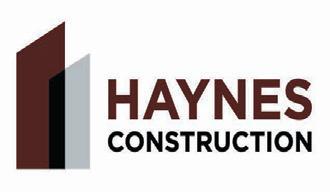
Seeking to employ experienced individuals in the labor, foreman, operator and teamster trades for a heavy outside work statewide. Reliable personal transportation and a valid drivers license required. To apply please call (860) 621-1720 or send resume to: Personnel Department, P.O. Box 368, Cheshire, CT06410.
International numbers available: https://v.ringcentral.com/teleconference
Invitation to Bid: 2nd Notice
Any individual requiring a Reasonable Accommodation to participate in the hearing may call the Reasonable Accommodation Manager (203) 498-8800, ext. 1506 or at the TDD Number (203) 497-8434.
Immediate opening for a full-time mechanic; maintenance to be done on commercial diesel trucks and trailers. A valid driver’s license is required in order to run company errands efficiently and safely. Send resume to: HR Manager, P. O. Box 388, Guilford, CT 06437 or email hrdept@eastriverenergy.com
The Town of Wallingford has an excellent career opportunity for a strong technical leader to be responsible for improving current facilities and providing for future growth of the water and wastewater systems. Applicants should possess 7 years of experience in engineering utility operations, of which 4 years must be water or wastewater related, plus a bachelor’s degree in civil or sanitary engineering, or an equivalent combination of education and qualifying experience substituting on a year-for-year basis. Salary: $113,556 to $141,944 annually. The Town offers an excellent fringe benefits package that includes pension plan, generous paid sick and vacation time, individual and family medical insurance, life insurance, 13 paid holidays, and deferred compensation plan. To apply online by the closing date of February 28, 2025, please visit: www.wallingfordct.gov/government/departments/human-resources/. Applications are also available at the Department of Human Resources located in Room #301 of the Town Hall, 45 South Main Street, Wallingford, CT 06492. Phone: (203) 294-2080; Fax: (203) 2942084. EOE
Continuum of Care, New Haven, Connecticut –
• Competitive salary and benefits package.
Affirmative Action/Equal Opportunity Employer M/F/V Drug Free Workforce
Old Saybrook, CT (4 Buildings, 17 Units) Tax Exempt & Not Prevailing Wage Rate Project

Apply online at https://ecc.myhousing.com or download an application at: http://www.elmcitycommunities.org

To receive an application by mail, please call 475355-7289 or send a written request to Attention: Waitlist Coordinator, Elm City Communities, PO Box 1912, New Haven, CT 06509
Submit paper applications
• Opportunity to work with a dynamic and supportive team.
CT. Unified Deacon’s Association is pleased to offer a Deacon’s Certificate Program. This is a 10 month program designed to assist in the intellectual formation of Candidates in response to the Church’s Ministry needs. The cost is $125. Classes start Saturday, August 20, 2016 1:303:30 Contact: Chairman, Deacon Joe J. Davis, M.S., B.S. (203) 996-4517 Host,General Bishop Elijah Davis, D.D. Pastor ofPitts Chapel U.F.W.B. Church 64 Brewster St. New Haven, CT
• Career growth and development opportunities within the company.
If you are an organized, detail-oriented professional with a passion for construction and project management, we encourage you to apply!
To Apply: Please send your resume and a brief cover letter to KLamontagne@galassomaterials.com
New Construction, Wood Framed, Housing, Selective Demolition, Site-work, Castin-place Concrete, Asphalt Shingles, Vinyl Siding, Flooring, Painting, Division 10 Specialties, Appliances, Residential Casework, Mechanical, Electrical, Plumbing and Fire Protection. This contract is subject to state set-aside and contract compliance requirements.
• In person at 356 Orange St, New Haven, CT 06511 (via the drop box located on the front door); or • Mail to PO Box 1912, New Haven, CT 06509
Galasso Materials LLC, a quarry and paving contractor, has positions open for the upcoming construction season. We are seeking candidates for a variety of positions, including: Scalehouse Dispatcher/ Equipment Operators and Laborers. NO PHONE CALLS. Please email resume and cover letter to “Hiring Manager”, Galasso Materials LLC, PO Box 1776, East Granby CT 06026.
If you need a reasonable accommodation to complete the application: Call 203-498-8800 ext. 1507
Bid Extended, Due Date: August 5, 2016
Galasso Materials is an Affirmative Action/Equal Opportunity Employer. All applicants will be considered for employment without attention to race, color, religion, sex, orientation, gender identity, national origin, veteran or disability status.
Anticipated Start: August 15, 2016
Applications will be available on 01/31/2025 Applications must be submitted by 03/07/2025

Galasso Materials LLC is committed to creating an inclusive environment for all employees and encourages applications from all qualified individuals. We are an affirmative action equal-opportunity employer.
Sealed bids are invited by the Housing Authority of the Town of Seymour until 3:00 pm on Tuesday, August 2, 2016 at its office at 28 Smith Street, Seymour, CT 06483 for Concrete Sidewalk Repairs and Replacement at the Smithfield Gardens Assisted Living Facility, 26 Smith Street Seymour.
A pre-bid conference will be held at the Housing Authority Office 28 Smith Street Seymour, CT at 10:00 am, on Wednesday, July 20, 2016.
Bidding documents are available from the Seymour Housing Authority Office, 28 Smith Street, Seymour, CT 06483 (203) 888-4579.
LEGAL NOTICE INVITATION TO BID: CONTINUUM OF CARE, NEW HAVEN is requesting licensed and insured contractor bids for their property located at 979 Quinnipiac Avenue, New Haven. Complete first floor kitchen renovation. Scope to include new kitchen layout. Owner to supply new cabinets. Scope to also include new flooring of area. Job also includes complete first floor bathroom renovation. This includes a complete gut (down to studs) of the bathroom. Environmental testing will be conducted by the owner. Scope includes supplying and installing new step in shower stall, vanity, toilet, tile flooring and wall finishes, tile 4ft wainscot is desired, lighting, grab bars by toilet and showers, exhaust fan with motion sensor, and baseboard heating. The scope of work to include floor drain for the bathroom. Scope to include replacement of existing windows, entry doors. Owner to select tile style, colors, and style of faucets and light fixtures. Further detailed information will be given on the scheduled site visit. GC price should include dumpster and permit feeds. Minority/women’s business enterprises are encouraged to apply. A bidding site meeting will be held at 979 Quinnipiac Avenue, New Haven on 11/22/2024 at 1pm. All bids are due by 12/6/2024 at 10 am. All bids, W9, work scope timeline and copy of license and questions should be submitted in writing to Monica O’Connor via email moconnor@continuumct.org or delivered to 109 Legion Avenue, New Haven.
The Town of Wallingford Water Division is seeking a skilled supervisor to direct a work crew engaged in the operation, maintenance, repair and construction of facilities pertaining to the Town’s potable water transmission and distribution system. Applicants should possess a H.S., trade/technical school diploma plus 5 years’ experience as a Maintainer for a water utility or in the field of construction, with work experience in the installation of underground pipelines (water main, sanitary sewer, storm drain or gas main) and related equipment; with two (2) of those years involved in the supervision of others. Up to two (2) years of post-high school education in an applicable field may substitute for the general experience requirement. Must possess at the date of appointment and maintain in good standing a valid State of Connecticut Class B Commercial Driver’s License (CDL). Wages: $30.43 to $36.64 hourly plus on-call pay when assigned. The Town offers an excellent fringe benefits package that includes pension plan, generous paid sick and vacation time, medical/dental insurance, life insurance, 13 paid holidays, and a deferred compensation plan. To apply online by the closing date of February 18, 2025, please visit: www.wallingfordct.gov/government/departments/human-resources/. Applications are also available at the Department of Human Resources located in Room #301 of the Town Hall, 45 South Main Street, Wallingford, CT 06492. Phone: (203) 294-2080; Fax: (203) 294-2084. EOE
Project documents available via ftp link below: http://ftp.cbtghosting.com/loginok.html?username=sayebrookevillage
Fax or Email Questions & Bids to: Dawn Lang @ 203-881-8372 dawnlang@haynesconstruction.com
HCC encourages the participation of all Veteran, S/W/MBE & Section 3 Certified Businesses Haynes Construction Company, 32
Immediate opening for a full time direct fueler for petroleum like products deliveries for days and weekends. A valid driver’s license and TWIC card are required. Send resume to: HR Manager, P. O. Box 388, Guilford, CT 06437 or email: hrdept@eastriverenergy.com
360 Management Group, Co. Is currently seeking bids for Agency Wide Plumbing Services & Preventative Maintenance. A complete copy of the requirements may be obtained from 360 Management Group’s vendor Collaboration Portal. https://newhavenhousing.cobblestonesystems.com/gateway beginning on Monday, September 23, 2024, at 3:00 PM.

The Housing Authority reserves the right to accept or reject any or all bids, to reduce the scope of the project to reflect available funding, and to waive any informalities in the bidding, if such actions are in the best interest of the

By Barnett Wright The Birmingham Times
Numerous leaders and institutions in Alabama — including The Birmingham Civil Rights Institute (BCRI), a non-partisan, non-political institution, and U.S. Rep. Terri Sewell — are expressing alarm as President Donald Trump rolls back Diversity, Equity and Inclusion (DEI) initiatives. That includes removing a Tuskegee Airmen history video from the Air
Force instruction curriculum, which was later reversed after widespread criticism. Many fear the move against the Tuskegee Airmen may become part of a trend but also shows what can happen when “collective” voices are heard.
On Wednesday, those voices were again heard. Trump’s budget office rescinded a memo freezing spending on federal loans and grants, less than two days after it sparked widespread confusion and legal challenges across
the country. The about-face was the latest sign of what can happen when voices are heard, say leaders.
“We cannot remain silent over President Donald Trump’s reversal of President Lyndon Johnson’s 1965 Executive Order that promoted equal opportunity for people of color and women in federal contractors’ recruitment, hiring, training and other employment practices,” wrote Rosilyn Houston, Chair, BCRI Board of Direc-
tors, in a statement on Sunday. “This is merely the latest shock wave in the relentless rollback of Diversity, Equity and Inclusion (DEI) initiatives at the federal and state levels as well as in the private sector.”
On Saturday, Sewell called on the U.S. Air Force to reinstate the video, saying “the Tuskegee Airmen bravely fought and died for our freedom before this nation even granted them full benefits of citizenship,” said Sewell. “To strip them from the Air Force curric-
ulum is an outrageous betrayal of our values as Americans. Their heroism is not ‘DEI.’ It is American history. I’m calling on the Air Force to immediately reverse this decision. We will not let our history be erased.”
One day later, Secretary of Defense Pete Hegseth said the removal of Tuskegee Airmen videos about the Tuskegee Airmen from its military instruction curriculum “has been immediately reversed.”
Con’t on next page
by BlackNews.com
The U.S. Air Force has removed lessons on the Tuskegee Airmen and Women Airforce Service Pilots (WASPs) from its training programs following President Donald Trump’s order to end diversity, equity, and inclusion (DEI) initiatives within the U.S. government.
The decision, confirmed by the Air Force, eliminates references to the Tuskegee Airmen — Black pilots, mechanics, and support staff who served during World War II — from basic training. The WASPs, female pilots who contributed to the war effort, have also been removed from the lessons.
The Tuskegee Airmen, who trained at Moton Field in Alabama, flew more than 15,000 combat sorties and played a key role in desegregating the armed forces after President Harry Truman’s 1948 Executive Order. Their accomplishments included destroying over 100 German aircraft, which

were significant to U.S. military history.
Tuskegee Airmen, Inc. expressed strong opposition to the removal, emphasizing that the soldiers are “an essential part of American history and carried significant weight.” The group urged President Trump and the Secretary of Defense to reverse the decision.
“We believe the content of these courses does not promote one category of service member or citizen over another,” the group said in a statement, according to USA Today. “They are simply a part of American military history that all service members should be made aware of.”
“As a nonprofit organization, we are required to remain apolitical. The opinions we express today reflect our values as a military heritage organization, committed to telling a full and accurate history of all service members of World War II, regardless of race, gender or national origin.”
“While I am relieved that our collective calls have forced the Trump Administration to reverse course, the removal of the Tuskegee Airmen from the Air Force curriculum should have never happened in the first place,” Sewell said. “We should all see the Trump Administration’s attacks on DEI for what they really are — an attempt to whitewash our history and devalue the contributions of African Americans.”
Trump, during his inaugural address on Jan. 20, vowed to end federal DEI practices, which he alleges are the government’s efforts to “socially engineer race and gender” into public and private lives. He then signed an executive order aimed at dismantling federal DEI programs.
The decision drew immediate outrage from many groups.
“We stand with federal employees and those in the private sector threatened by this executive order which poses a threat to civil rights and equal opportunity in the workplace for all,” wrote Houston. “There are livelihoods at stake with people on the cusp of losing their jobs, just because the jobs are just. We call on President Trump, the U.S. government, all state governments, and the American private sector to stop the attacks on DEI so that all people can have an opportunity to pursue the American dream.”
In 2007, President George W. Bush awarded the Tuskegee Airmen the Congressional Gold Medal in a ceremony at the Capitol Rotunda.
All of the nearly 1,000 Black military pilots who trained in the U.S. during World War II did so in Tuskegee, a city of about 8,700 residents today that is 87 percent Black.
Mark Brown, president and CEO at Tuskegee University, also said “the story of the Tuskegee Airmen is not one of diversity and inclusion rather it’s an American story of the evolution of Air Power and inclusion of all available talent.”
Brown, who spent 32 years in the Air Force culminating as the Deputy Commander of Air Education and Training Command, added, “the Tuskegee Airmen story is truly an American story. Collectively, these experiences help build the world’s greatest Air Force.”
The history video, which describes the exploits of the groundbreaking Black airmen trained in Tuskegee during World War II, was part of a DEI-related course taken during basic military training at Joint Base San Antonio-Lackland, a hub of Air Force training.
During the 1920s and ‘30s, the exploits of record-setting pilots like Charles Lindbergh and Amelia Earhart had captivated the nation, and thousands of young men and women clamored to follow in their footsteps.
But young African Americans who aspired to become pilots met with significant obstacles, starting with the widespread (racist) belief that Black people could not learn to fly or operate sophisticated aircraft.
In 1938, with Europe teetering on the brink of another great war, President Franklin D. Roosevelt announced he would expand the civilian pilot training program in the United States.
At the time, racial segregation remained the rule in the U.S. armed forces—as well as much of the country. Much of the military establishment (particularly in the South) believed Black soldiers were inferior to whites, and performed relatively poorly in combat.
But as the AAC began ramping up its training program, Black newspapers like the Chicago Defender and Pittsburgh Courier joined civil rights groups like the NAACP in arguing that Black Americans be included.
In September 1940, Roosevelt’s White House responded to such lobbying campaigns by announcing that the AAC would soon begin training Black pilots.
could be affected by the new administration’s outlook on Diversity, Equity and Inclusion programs.
The Center for Racial Justice in Education said educators may be more encouraged to teach Black history in their classrooms throughout the year. “Resistance takes many inspiring forms, and those dedicated to celebrating this essential history are employing creative and strategic approaches to share and further develop it,” the organization said in an email. Hayes agreed and said it could encourage others to teach communities about the contributions of Black people.
“African Americans, Black folks throughout the world, just like all cultures throughout the world, have taken ownership of their history,” he said. “And these various political developments may shape the contours of it. But this story is going to be told regardless of the political dynamics of the particular time.”



For the training site, the War Department chose the Tuskegee Army Air Field in Tuskegee, Alabama, then under construction. Home to the prestigious Tuskegee Institute, founded by Booker T. Washington, it was located in the heart of the Jim Crow South.
The program’s trainees, nearly all of them college graduates or undergraduates, came from all over the country. In addition to some 1,000 pilots, the Tuskegee program trained nearly 14,000 navigators, bombardiers, instructors, aircraft and engine mechanics, control tower operators and other maintenance and support staff.
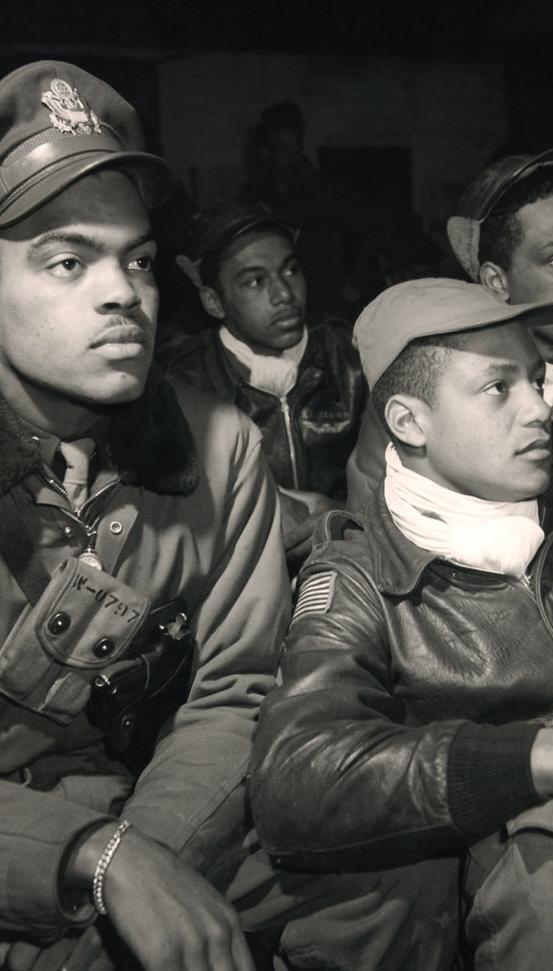

Among the 13 members of the first class of aviation cadets in 1941 was Benjamin O. Davis Jr., a graduate of West Point and the son of Brig. Gen. Benjamin O. Davis, one of two Black officers (other than chaplains) in the entire U.S. military.
The “Tuskegee Experiment” took a great leap forward in April 1941 thanks to a visit by Eleanor Roosevelt to the airfield. Charles “Chief” Anderson, then the chief flight instructor in the program, took the first lady on an aerial tour, and photos and film of that flight helped publicize the program.
Tuskegee Airmen in World War II
In April 1943, the Tuskegee-trained 99th Pursuit Squadron deployed to North Africa, which the Allies had occupied.
In North Africa and then Sicily, they flew missions in second-hand P-40 planes, which were slower and more difficult to maneuver than their German counterparts. After the commander of the 99th’s assigned fighter group complained about the squadron’s performance, Davis had to defend his men before a War Department committee.
Rather than being shipped home, the 99th was moved to Italy, where they served alongside the white pilots of the 79th Fighter Group. In early 1944, pilots from the 99th shot down 12 German fighters in two days, going some distance toward proving themselves in combat.
In February 1944, the 100th, 301st and 302nd fighter squadrons arrived in Italy; together with the 99th, these squadrons of Black pilots and other personnel made up the new 332nd Fighter Group.
By Julianne Malveaux
The 47th President has attacked our government like a bull in a China closet. He is doing his best to upend precedent and policy, as he promised that he would. He issued hundreds of executive orders, pardoned convicted criminals (like himself), manipulated the truth through websites, abolished DEI (diversity, equity, and inclusion measures), put hundreds on administrative leave, and caused more damage in just a few days than most do in a lifetime.
Additionally, wholesale deportations of undocumented people have shattered families, disrupted communities, and upended some international relationships. Wow! The folks who chose to stay home during this election are regretting it. There were those who said that he wouldn’t be “so bad,” but he has been worse than we could ever have imagined. But it is what most voters, that is, those who were not suppressed out, chose.
The Department of Defense, zealous acolytes genuflecting at the President’s anti-DEI stance, decided to scrub references to the Tuskegee Airmen in their Air Force training videos. Within days, his morally compromised choice and marginally selected Secretary of Defense reversed that decision. The Tuskegee Airmen videos are back in. This is not cause for celebration. The fact that the anti-DEI forces that now reign could attempt to erase history, and they will continue to attempt to rewrite reality. Erasing the Tuskegee Airmen is at the tip of the iceberg. These people are so creative that they can turn a violent insurrection into a benign Capitol tour, although who comes to a Capitol tour with weapons and bear
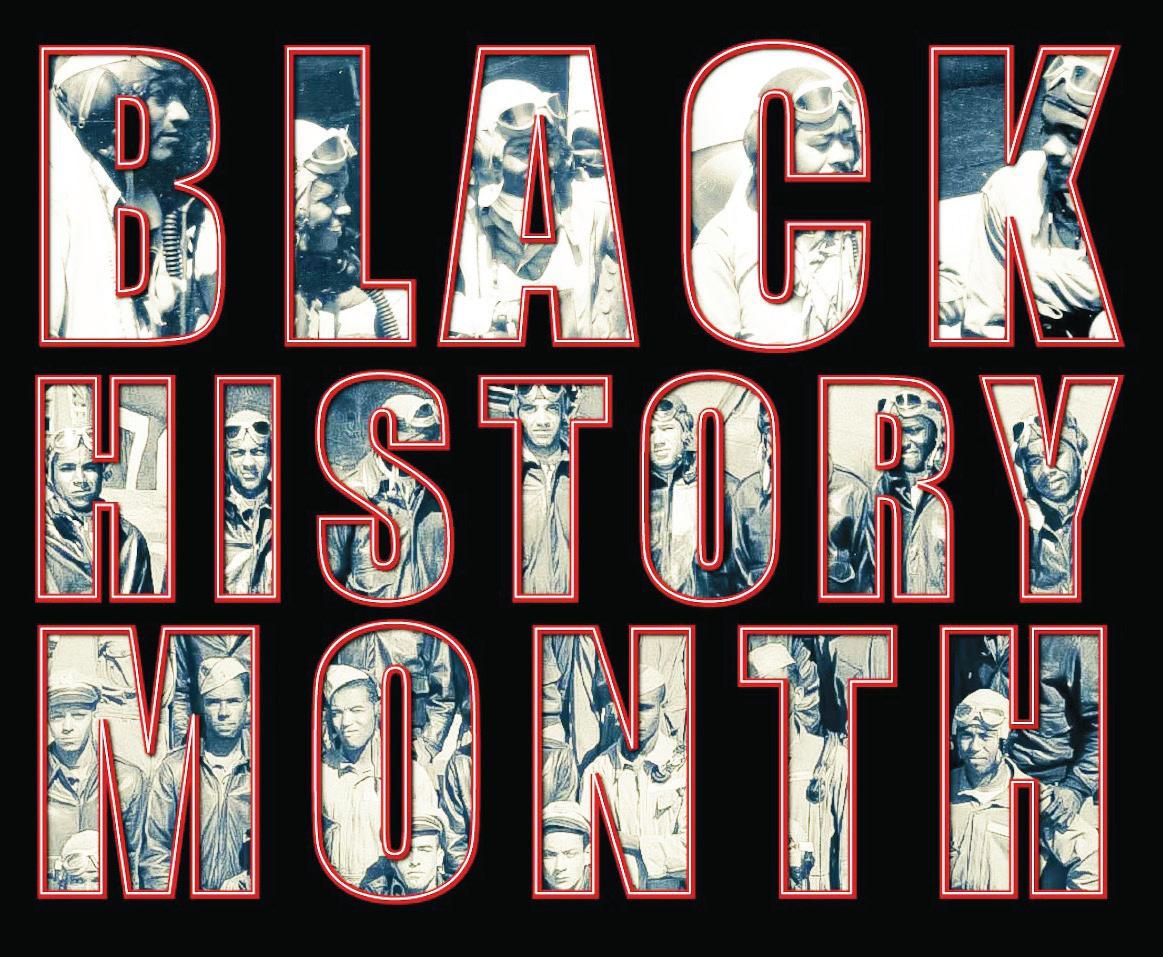
spray? The violent, rabid, insurrection crowd has been described by the current President as “peaceful” “hostages,” even as many have been convicted of assault against law enforcement officers. If they can erase the unlawful actions of January 6, they can attempt to erase the massive contributions of African American people to this country. We will not be erased.
Dr. Carter G. Woodson, founder of Negro History Week, now African American History Month, established our historical presence because of our nation’s tendency
to forget injustice. Many, like Presidential sidekick Elon Musk, who has encouraged Germans to move “past guilt” of the Holocaust, indeed exhorting them not to “lose” their culture “in some sort of multiculturalism.” He is the Trump whisperer, and it is likely that he and 47 are having similar conversations about the role that multiculturalism and an acknowledgment of it has in contemporary society. They don’t want to go back and embrace our flawed past. Instead, they’d prefer to swallow our differences with a sense of
misplaced pride in our past. Make America Great Again? Really, when was it ever great for the exploited?
The unsuccessful attempt to erase Tuskegee from Air Force training tapes is not the worst thing this administration has done. Abruptly halting federal grand programs, including food assistance, impacts millions and is an unnecessary flexing of power muscles. Peremptorily and illegally firing inspectors general in several government departments is a bullying tactic. Somebody does not want inspectors
general because they do not want illegal actions to be inspected. With skillful manipulation of the facts, there are those who can characterize them as justified, no illegal and non-Constitutional acts. We are in an era where truth doesn’t matter, CNN anchor Jim Acosta abruptly announced his departure from the network on January 28. He left an ominous parting message – “It is never a good time to bow down to a tyrant…Don’t give in to the lies. Don’t give into the fear. Hold onto the truth and hope.” I’m grateful to Acosta for putting it out there and disappointed that so many others are holding their tongues and currying favor with the Felon-in-Chief.
Where does that leave African American people? We are living in a sad and empowering time. What did we do before government assistance? What did we do before federal dollars subsidized our Black History Month celebrations? What did we do without DEI programs? We survived. We thrived. We heard the song “God Bless the Child,” and we went to get our own. We didn’t get what we deserved; we didn’t get all of it. But we got it. We taught our history in churches and in Saturday schools. We gathered in salons in private homes. We taught our children about our struggles. We didn’t need government to do it.
We will not be erased, no matter how hard they try. It’s a Sankofa moment for Black folks. Go back and get what has been instrumental to our survival heretofore. Go back and get the resilience. Go back and get the creativity. Go back to go forward. We will not be erased. Dr. Julianne Malveaux is an economist and author based in Washington, DC. Juliannemalveaux.com.
Known for quietly breaking barriers during her remarkable military career, Leftenant-Colon enjoyed a legacy of resilience, excellence, and service.
By Stacy M. Brown
NNPA Newswire Correspondent
@StacyBrownMedia
Nancy Leftenant-Colon, the first Black woman to join the U.S. Army Nurse Corps after the military was desegregated in the 1940s, has died at the age of 104. She passed away earlier this month at a nursing home in New York. Known for quietly breaking barriers during her remarkable military career, Leftenant-Colon enjoyed a legacy of resilience, excellence, and service.
Born on September 29, 1920, in Goose Creek, South Carolina, to James and Eunice Leftenant, she graduated from Amityville High School in New York in 1939. Despite facing racial discrimination, Leftenant-Colon pursued her passion for nursing, graduating from Lincoln School of Nursing in 1941. According to her biography posted on Tuskegeeairmen.org, when she initially

sought to join the Armed Forces, she was denied due to her race. Undeterred, she persisted and was accepted as a reservist into the Army Nurse Corps in January 1945, becoming a Second Lieutenant and serving at Fort Devens, Massachusetts, treating wounded soldiers from World War II.
In 1948, after President Harry Truman issued Executive Order 9981 abolishing segregation in the military, Leftenant-Colon became the first Black woman integrated into the Regular Army Nurse Corps. Her career continued to flourish as she transitioned to the newly established U.S. Air Force, where she supported missions during the Korean and Vietnam Wars, serving in various locations, including Germany, Japan, Alaska, and Vietnam. As a Flight Nurse with the 6481st Medical Air Evacuation Group, she evacuated wounded soldiers from active war zones and was credited with saving countless lives.
Her groundbreaking service extended be-
yond the battlefield. In 1989, she became the first woman elected as National President of the Tuskegee Airmen, Inc., where she held multiple leadership roles. Honored with numerous accolades, Leftenant-Colon received honorary doctorates from Tuskegee University and Mount Saint Vincent College and was inducted into the Long Island Air and Space Hall of Fame.
After retiring as Chief Nurse at McGuire Air Force Base in 1965, Leftenant-Colon continued to serve her community as a school nurse at her alma mater, Amityville High School, until 1984. In 2018, the school honored her with a new media center named in her memory.
“She was just an awesome person,” her nephew Chris Leftenant told The Associated Press. “She never created waves when she was doing all this first this, first that. She never made a big thing of it. It was just happening.”

